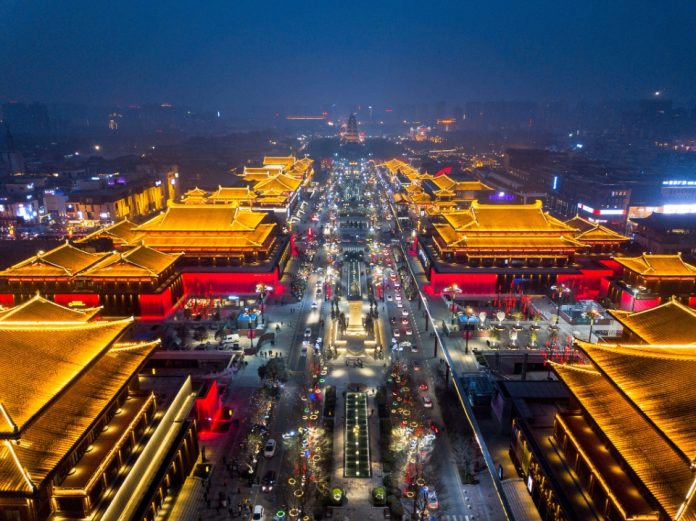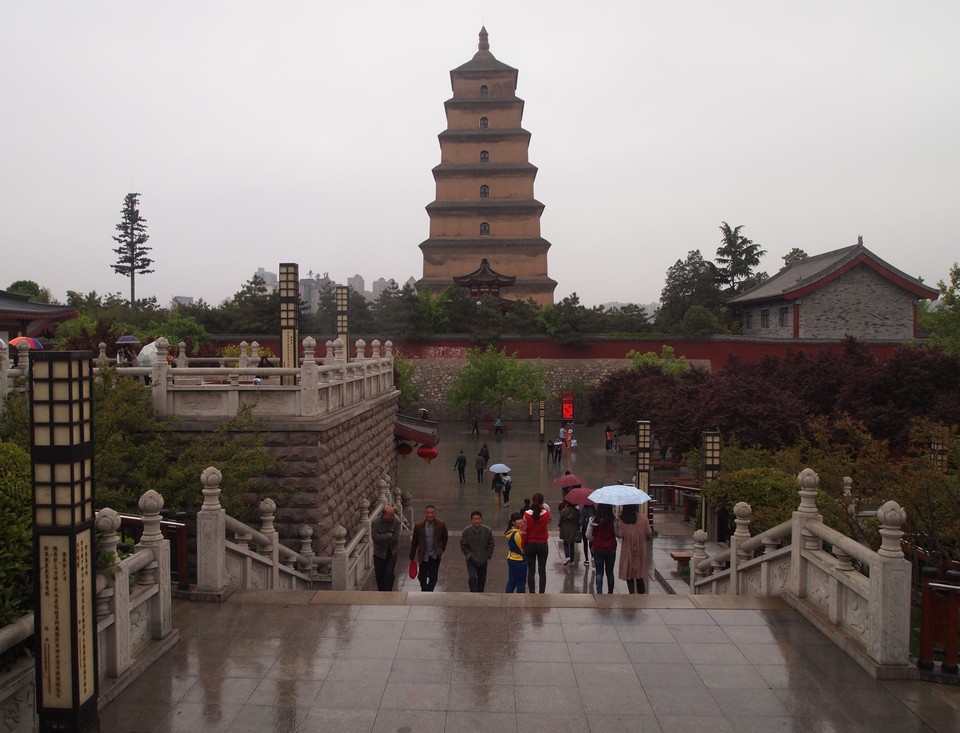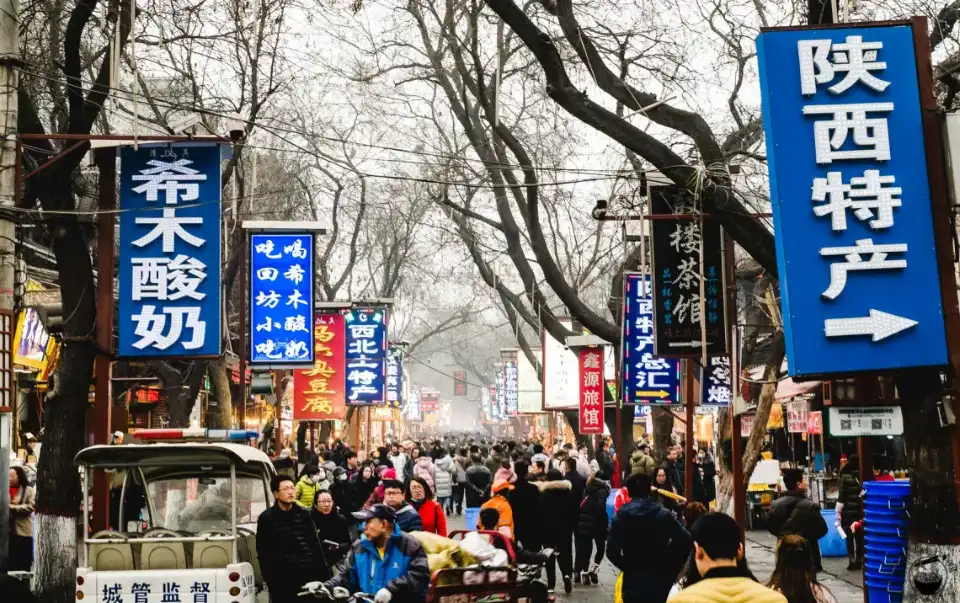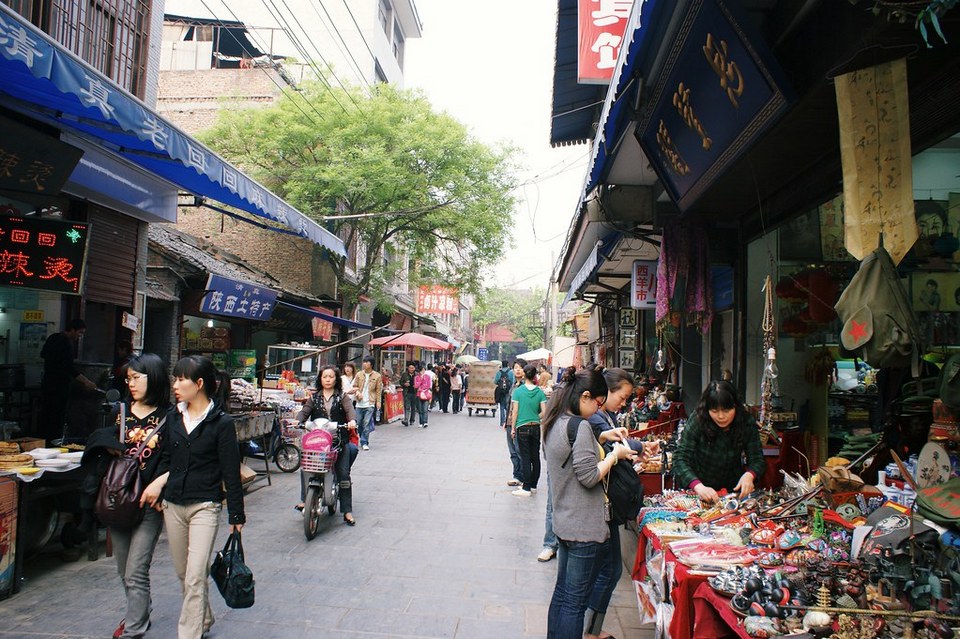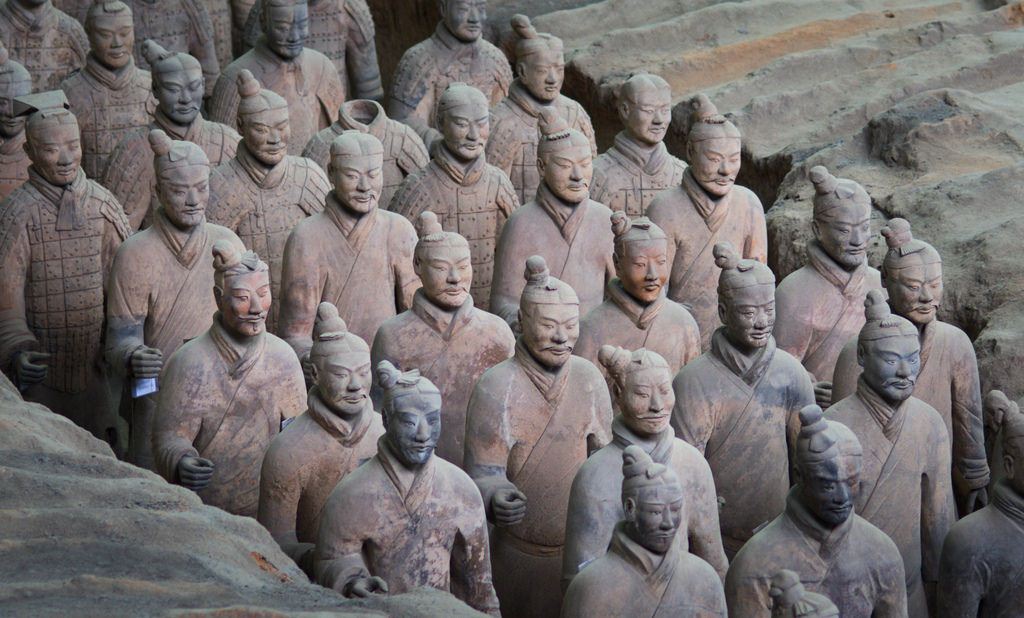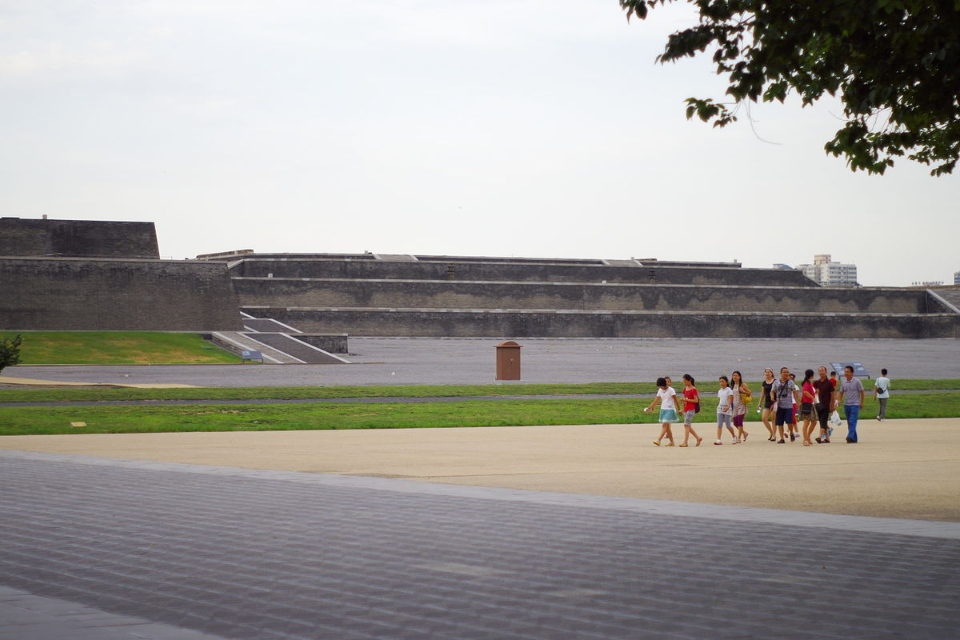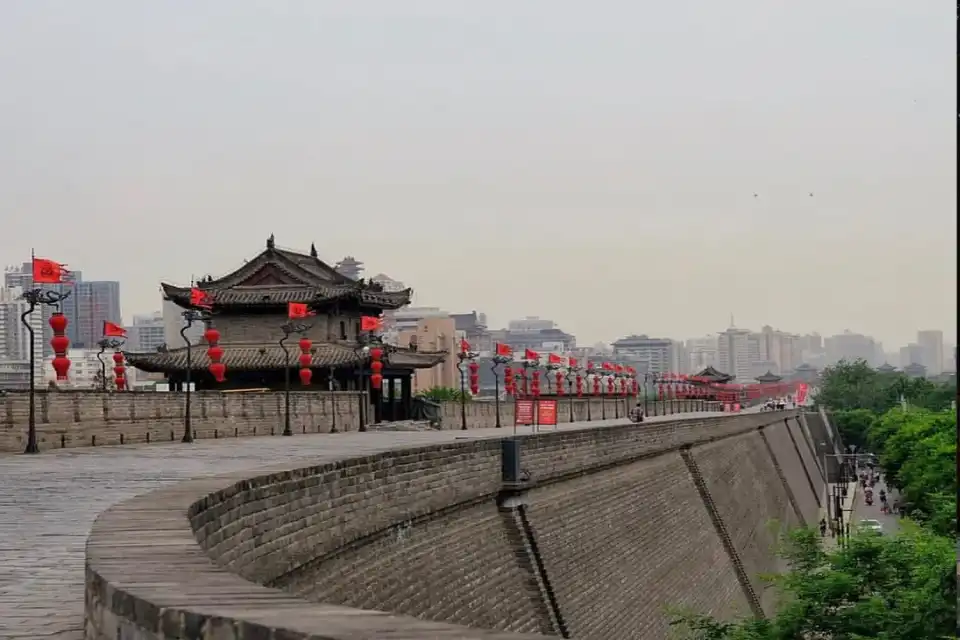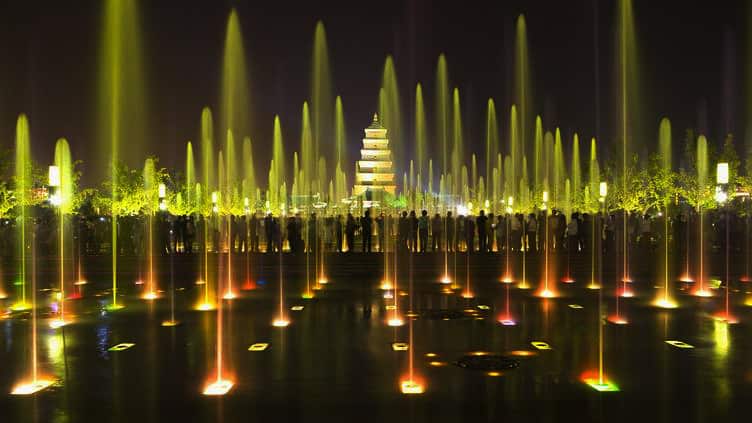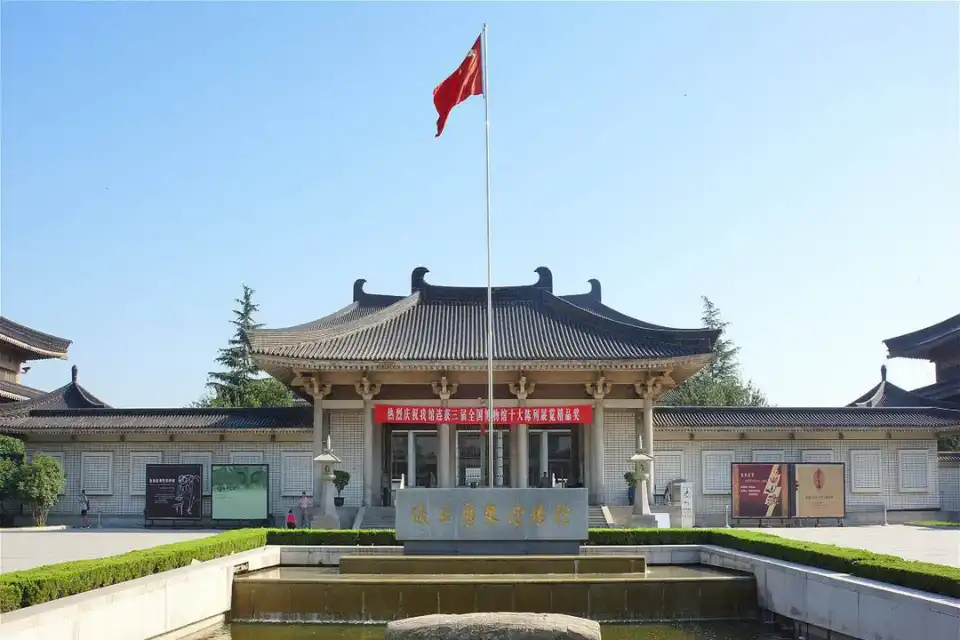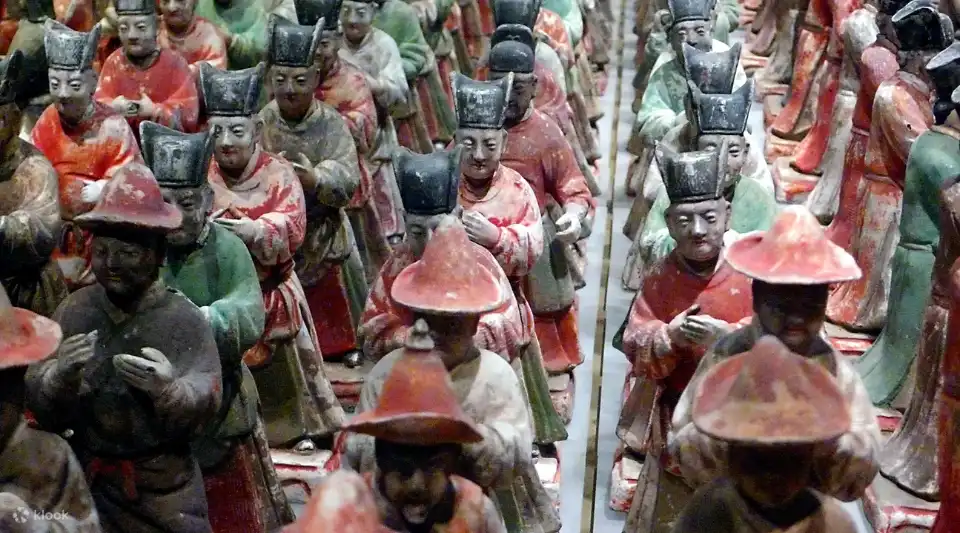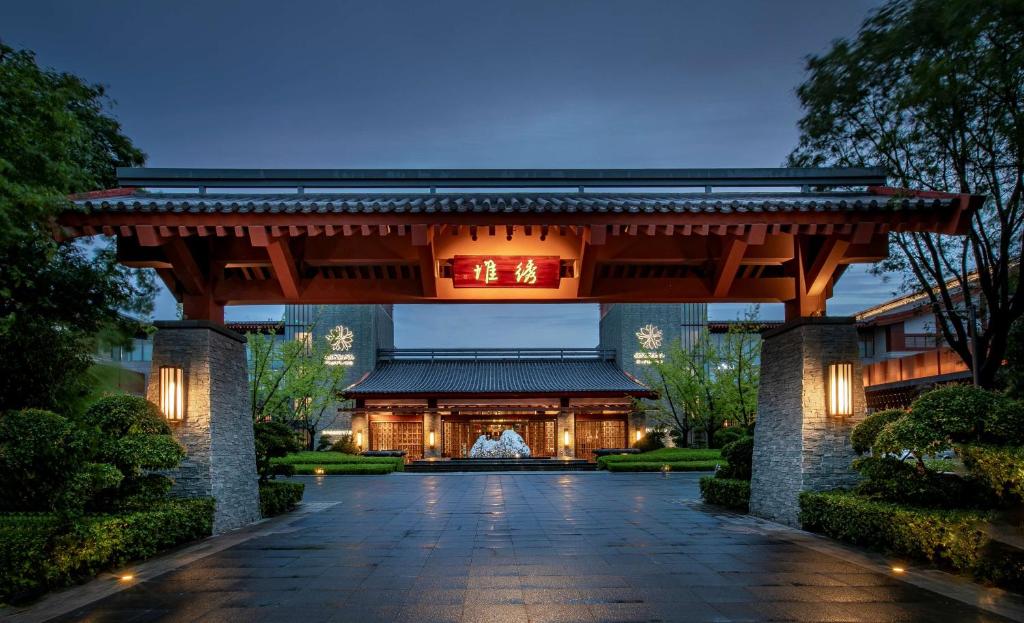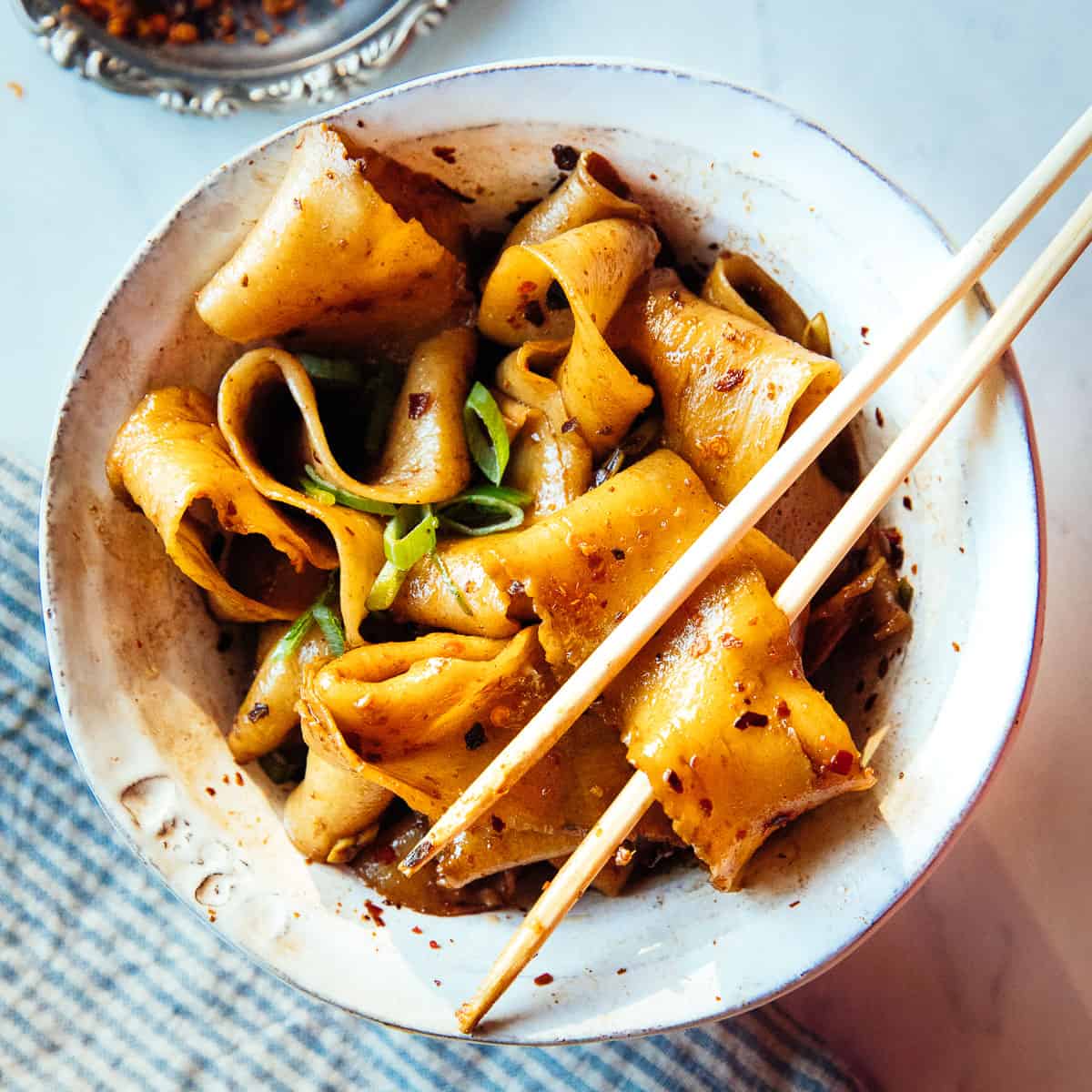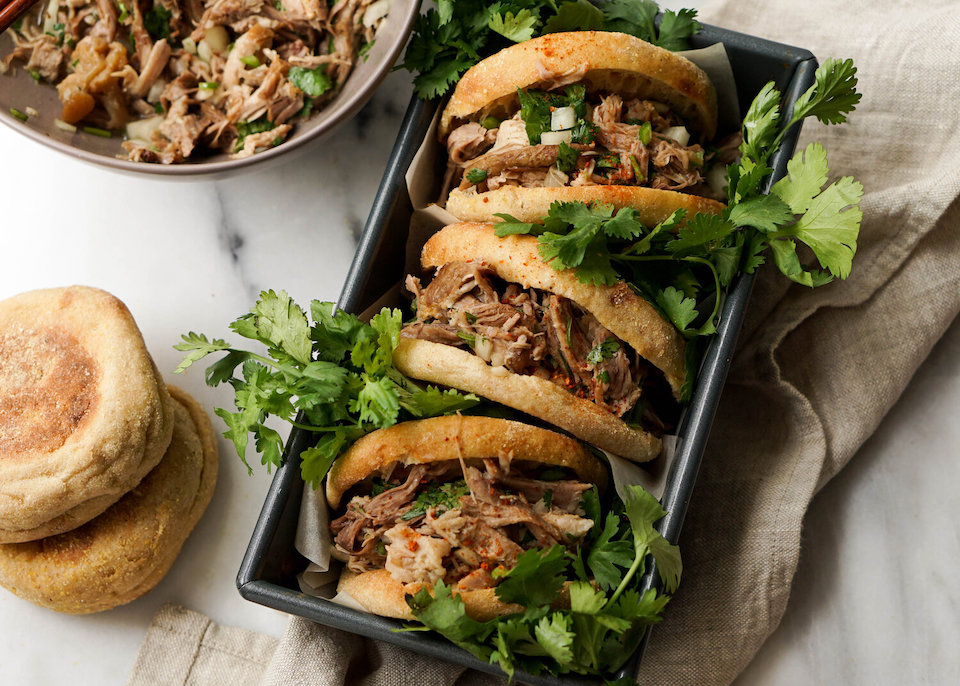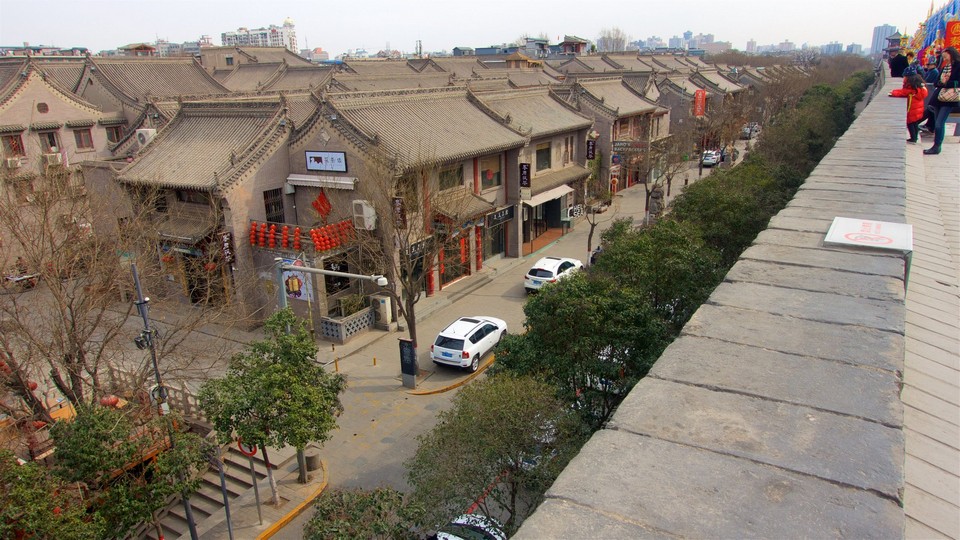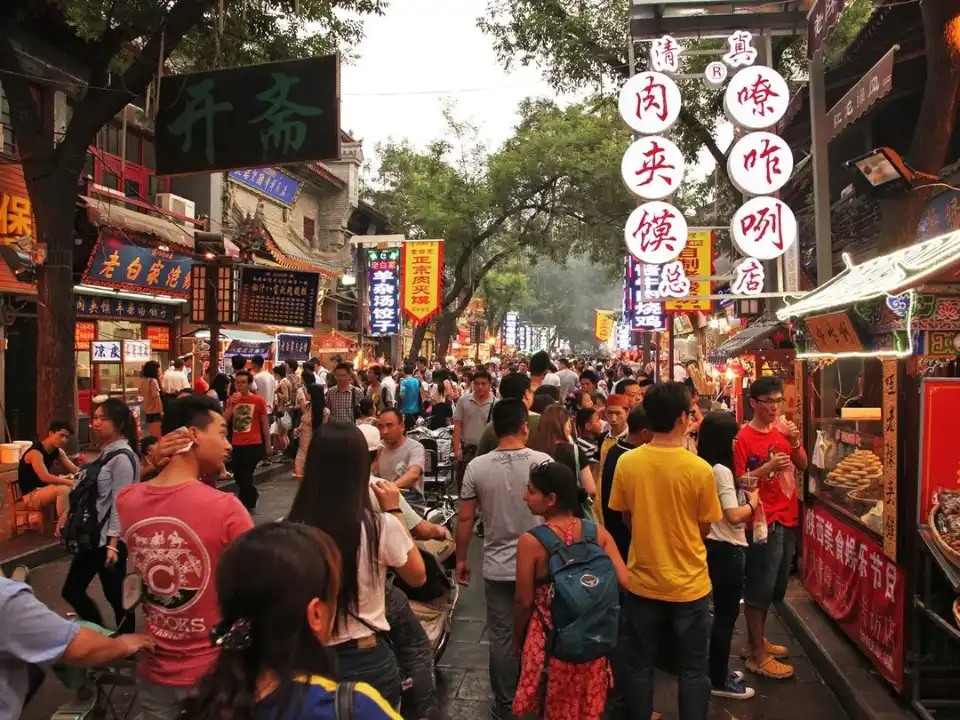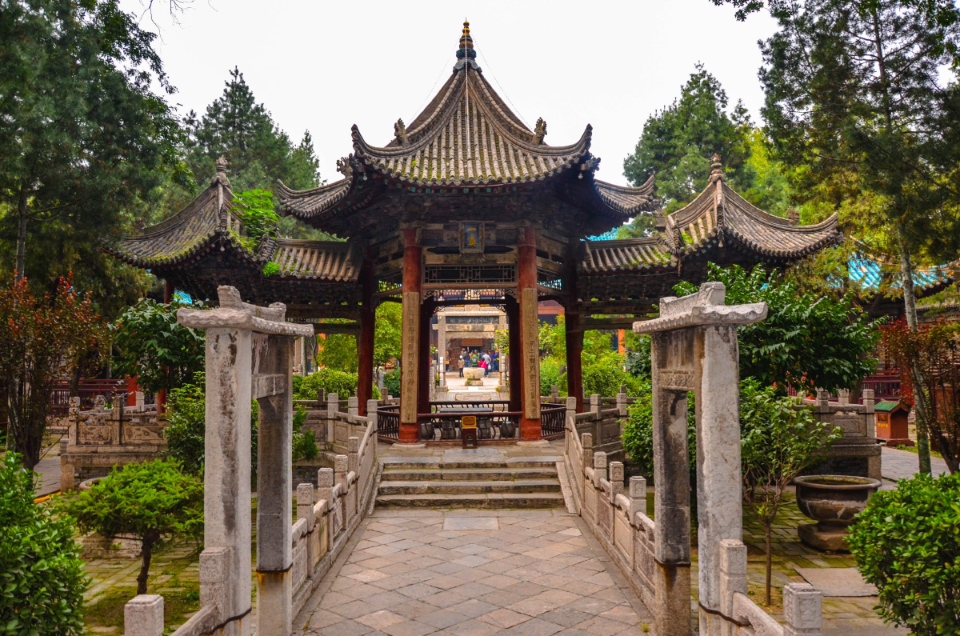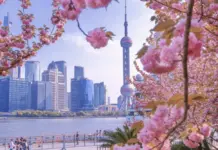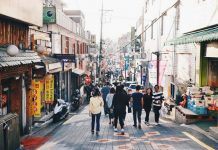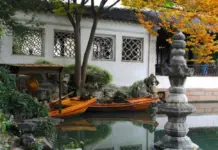What to do and where to visit when traveling to Xi’an? Let’s go back in time to explore the prosperous thousand-year-old capital of China through our Xian china travel blog (Xian blog) with the super Xian china travel guide (Xi An china guide, Xi An China travel guide) below!
- Sunac Land Guangzhou review: A Four-Season Entertainment Experience
- 48 Hours of Cherry Blossom Viewing in Beijing for First-Time Visitors
- Visiting Lingering Garden in Suzhou – One of the Four Great Chinese Classic Gardens
- The ULTIMATE Forbidden City travel guide: How to visit, things to do, tips & MORE
- Legoland Shanghai Review: A Self-Guided to LEGOLAND Shanghai Resort
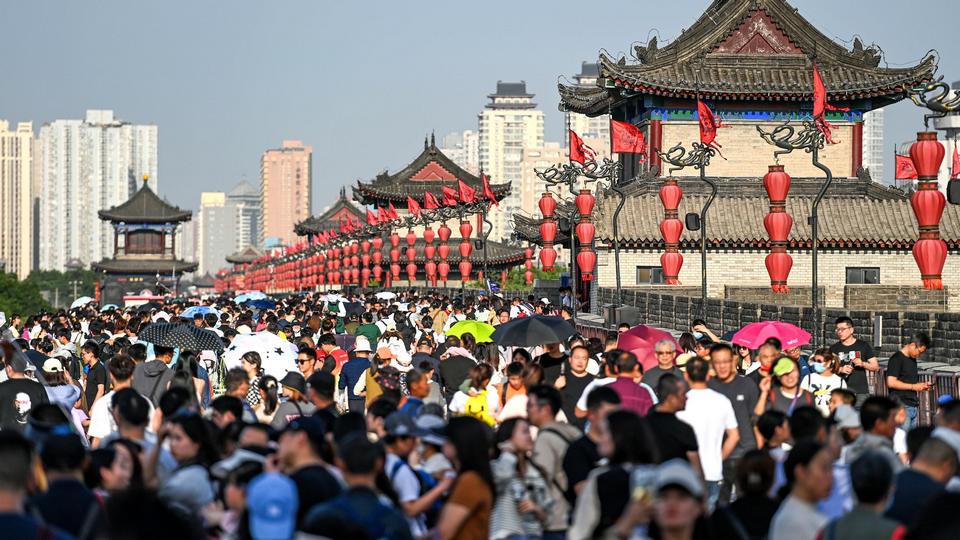
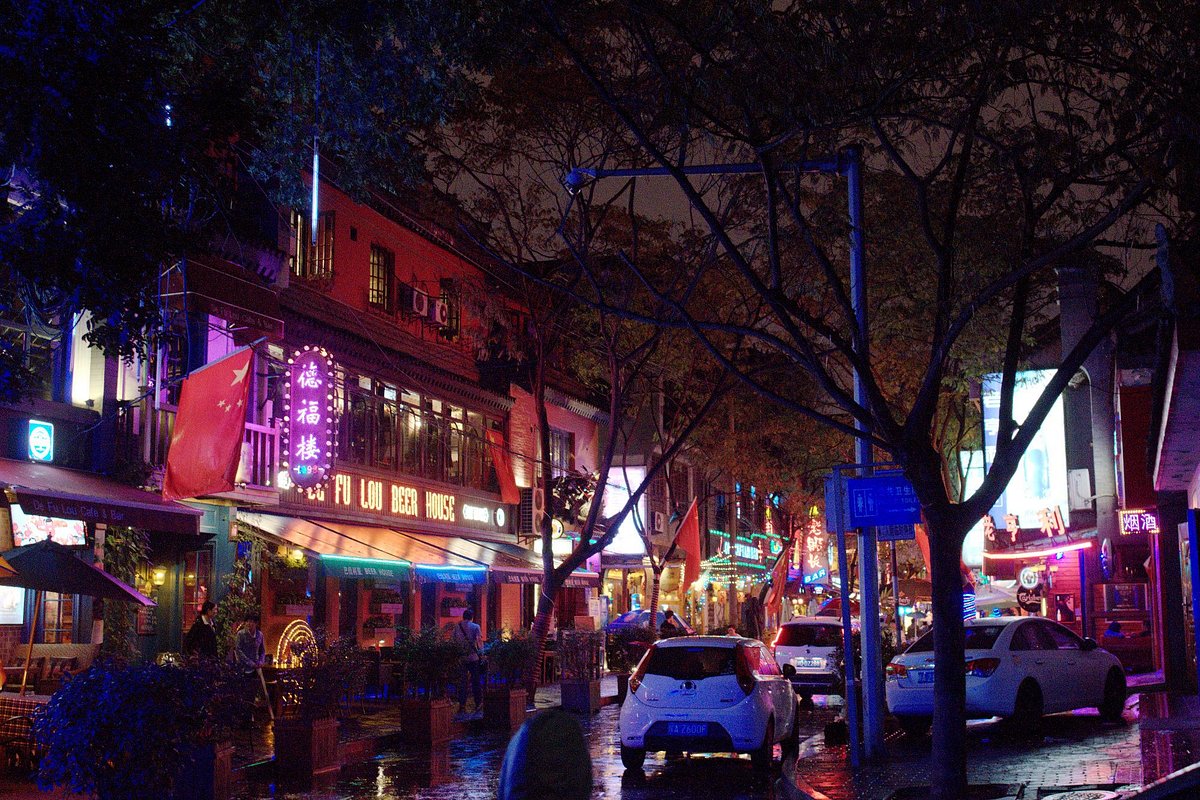
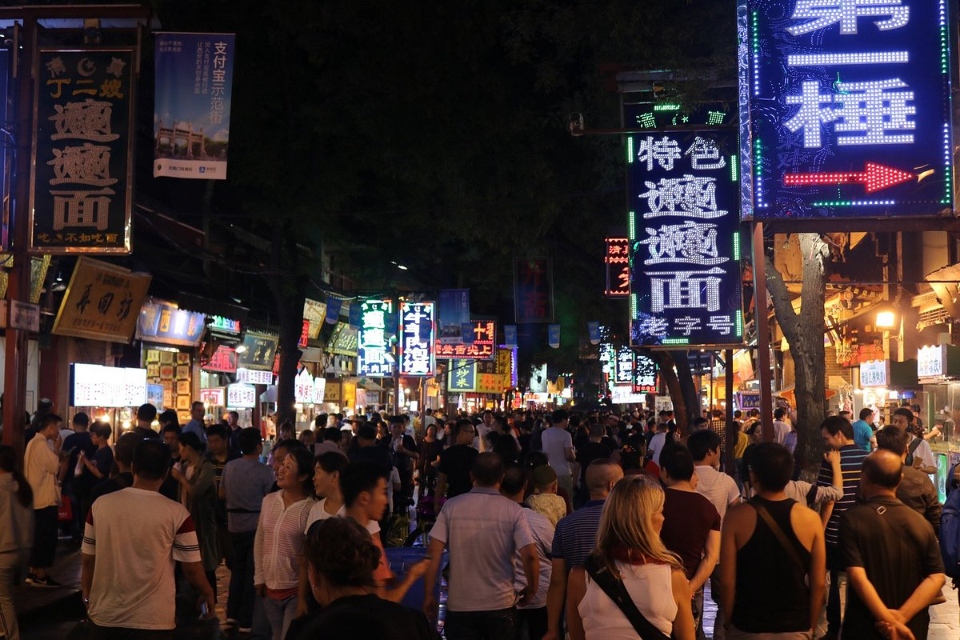
Located in the center of China, Xi’an – the capital of Shaanxi province is one of the four greatest ancient capitals in the world, comparable to Athens, Rome and Cairo. From the 11th century BC to the 10th century AD, this place was chosen as the capital by 13 dynasties, leaving behind a massive cultural heritage. In 1981, UNESCO recognized Xi’an as a World Historical and Cultural City.
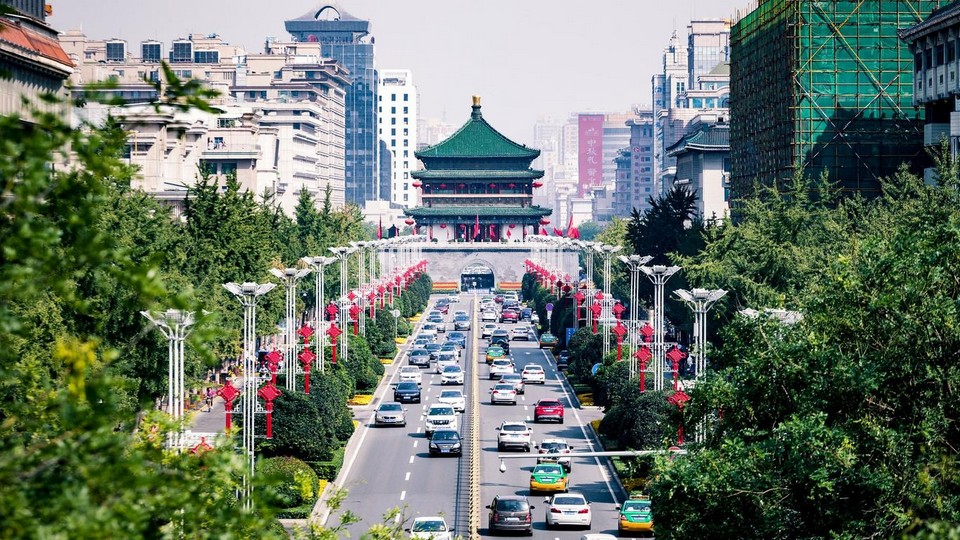
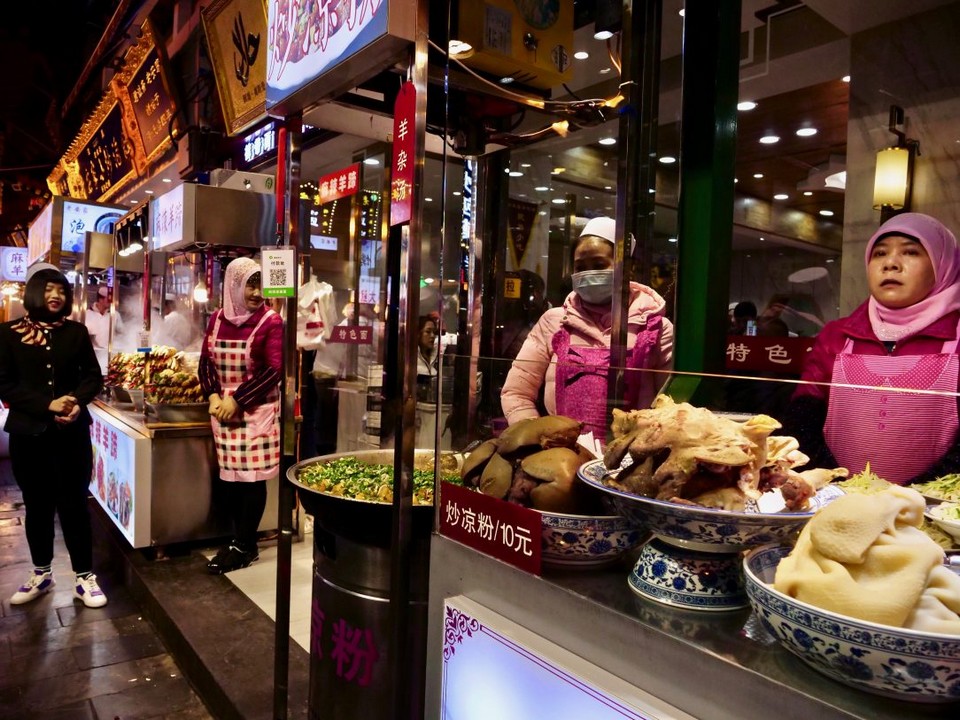
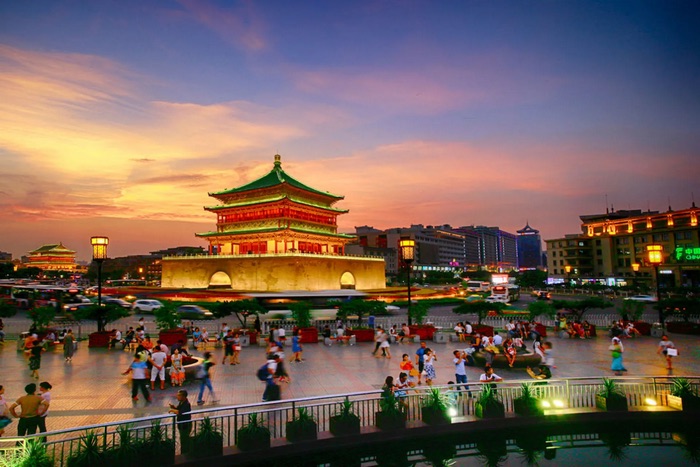
Traveling to Xi’an is a journey that takes you into the beauty of historical values and famous legendary stories. The Terracotta Army, or the Silk Road, are all testaments to the brilliant development of a powerful ancient China. Explore Xi’an with Klook Vietnam and “pocket” useful experiences for your upcoming trip!
Where is Xi’an? (#Xian China travel blog)
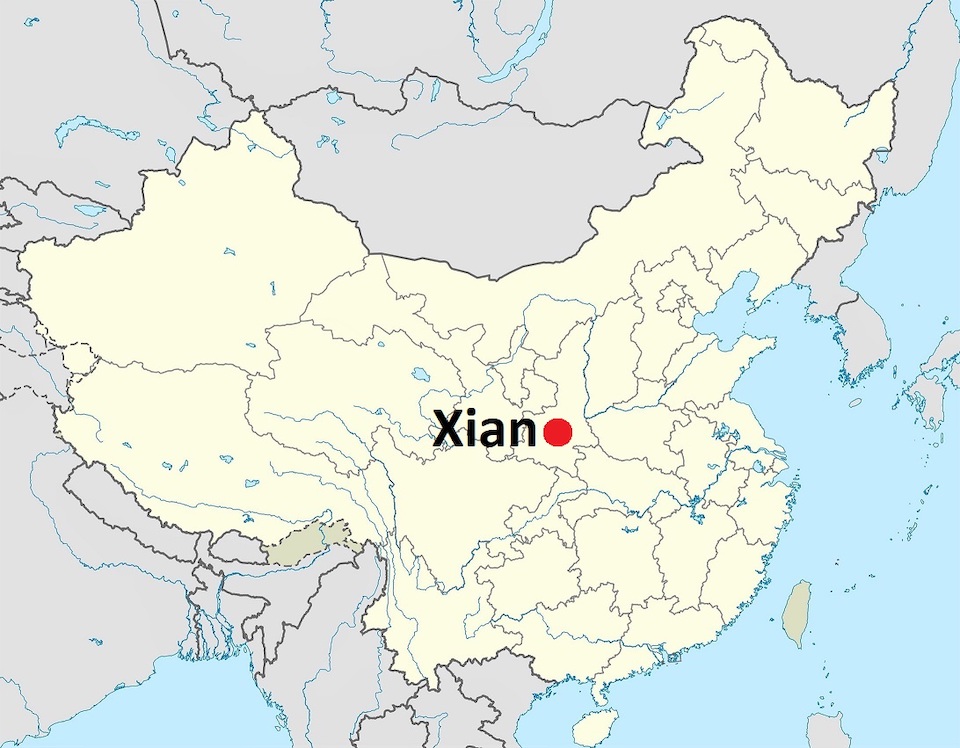
Located on the vast plain of Guanzhong, south-central Shaanxi Province, Xi’an is a city surrounded by eight rivers and streams, creating a harmonious natural landscape. To the south of the city is the foot of Qinling Mountain, and to the north is the Wei River. About 100 km to the east is Mount Huashan – one of the five sacred mountains of Taoism. Not far to the north, the Loess Plateau stretches out endlessly.
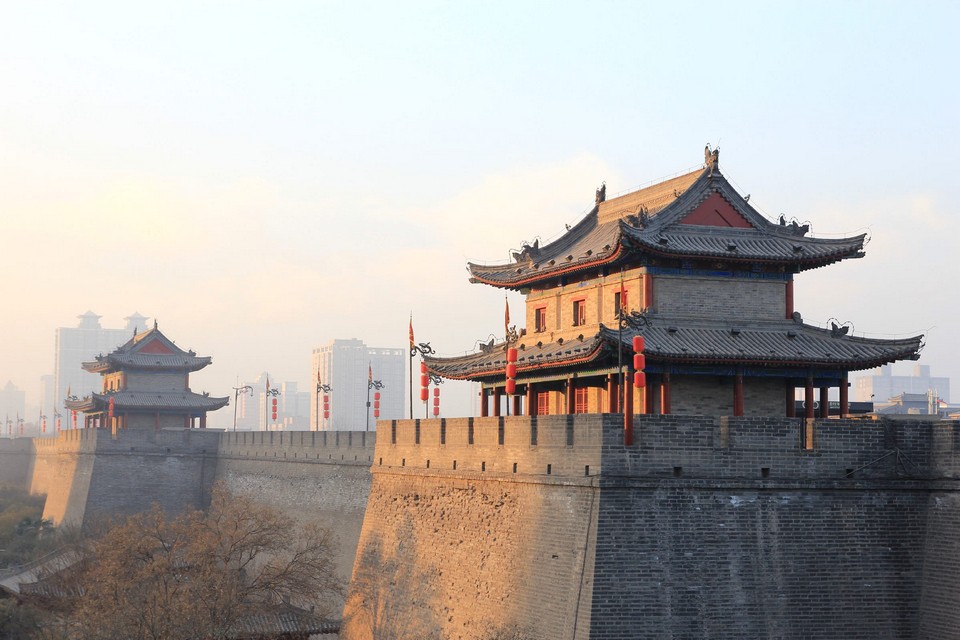
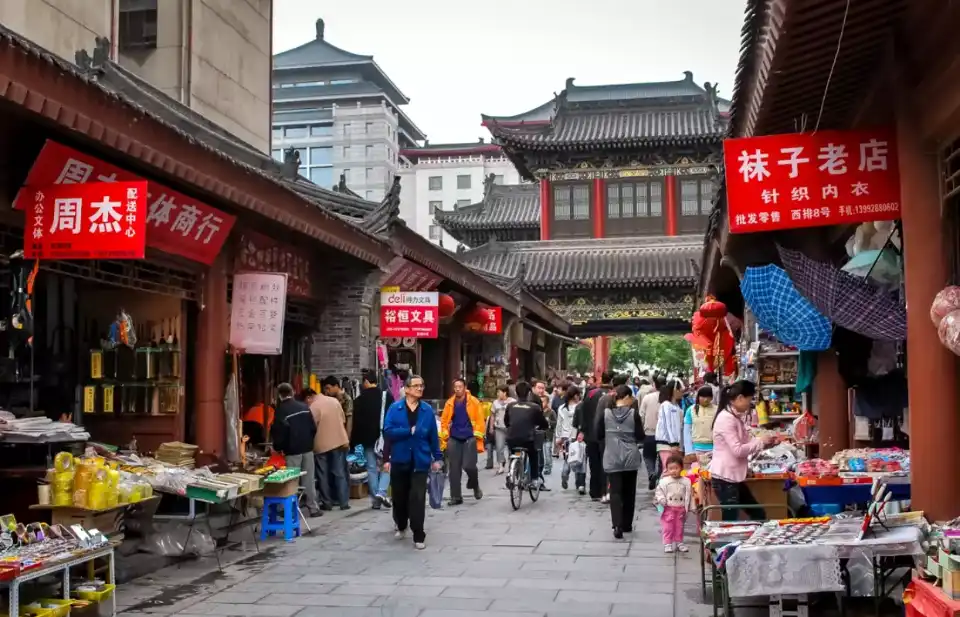
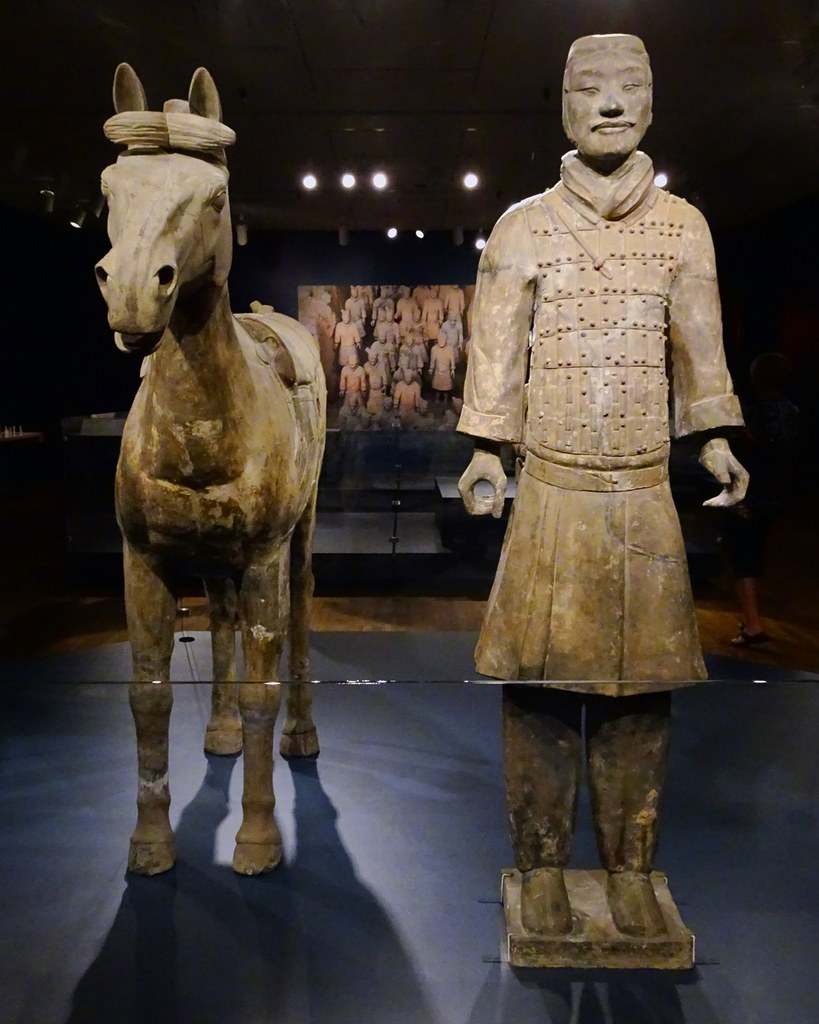
During the Han Dynasty, the great strategist Zhang Liang suggested that Emperor Liu Bang (Emperor Gaozu of Han) choose Guanzhong as his capital, because this location was favorable for both defense and development. He described the Guanzhong Plain as an iron fortress stretching for thousands of miles, as rich as a heavenly kingdom.
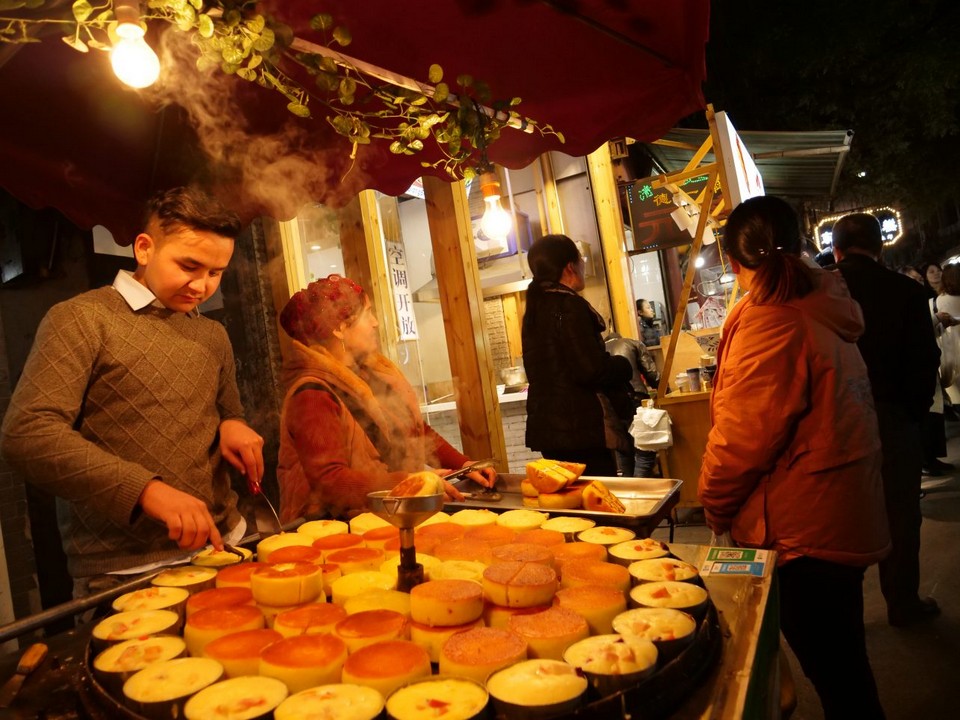
With a history of thousands of years, Xi’an was the capital of many important dynasties such as the Zhou, Han, Sui and Tang dynasties. This city played a role in the cultural and political center of ancient China, was a trading point on the Silk Road and is home to famous relics such as the Terracotta Warriors of Qin Shi Huang. Today, Xi’an has developed into a modern urban area, but still preserves many historical heritages, attracting tourists from near and far.
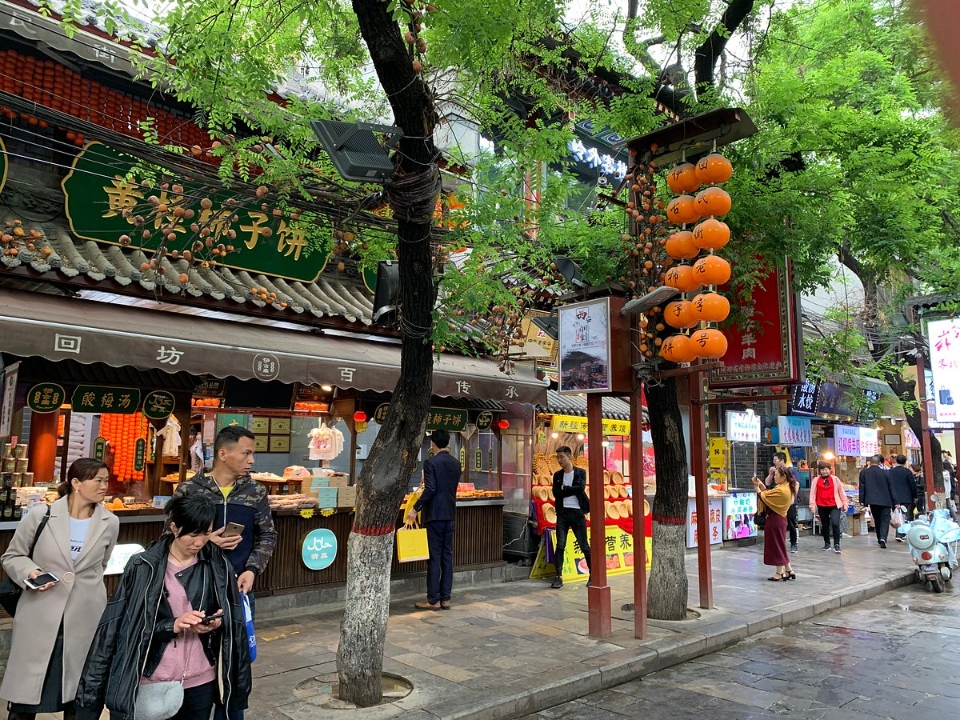
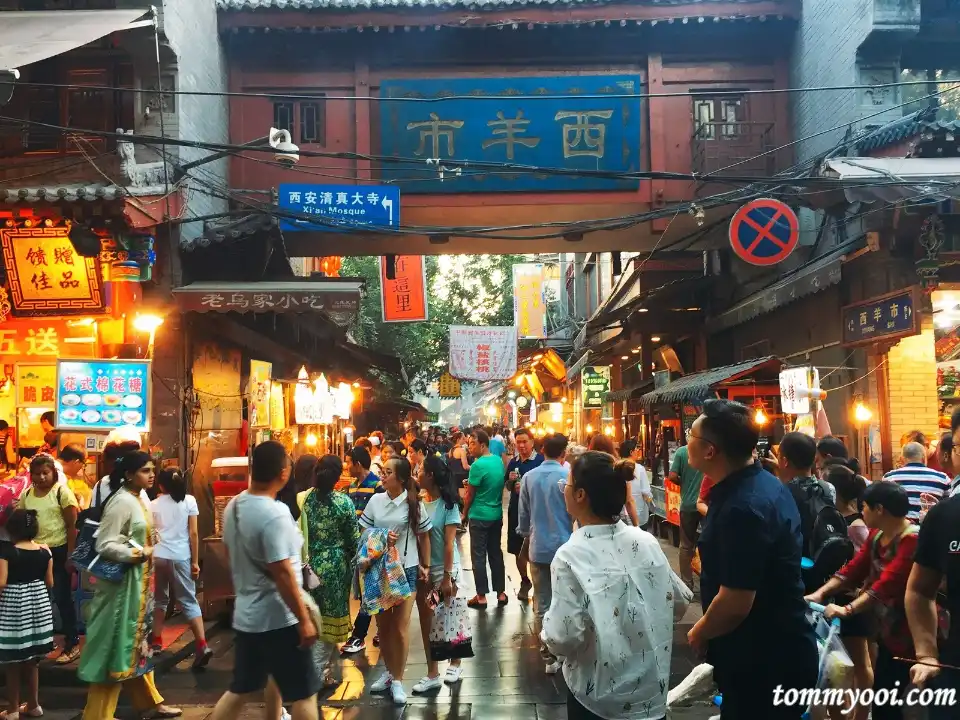
Guide to Traveling to Xi’an – China – From Vietnam
Traveling to Xi’an from Vietnam is quite easy and convenient by air and road. Refer to the specific travel methods below:
- Air: Airplane is the fastest and most convenient option, with flights from Hanoi (Noi Bai) or Ho Chi Minh City (Tan Son Nhat) to the airport near Xi’an. Ticket prices usually range from 7-10 million VND, depending on the airline and time. You should book tickets in advance and look for promotional programs to save money.
- Passenger car: If you want to experience the road, you can take a car to Mong Cai or Huu Nghi border gate, then continue your journey to Xi’an. The cost of a bus from Vietnam to the border gate is about 100,000 – 500,000 VND. Don’t forget to prepare your passport and visa for immigration procedures.
- Train: To travel to Xi’an by train, you need to depart from Gia Lam station (Hanoi) to Nanning (China) and then continue to Xi’an. The ticket price is about 750,000 VND/person. However, you need to book tickets at least 3 days in advance if departing from Nanning.
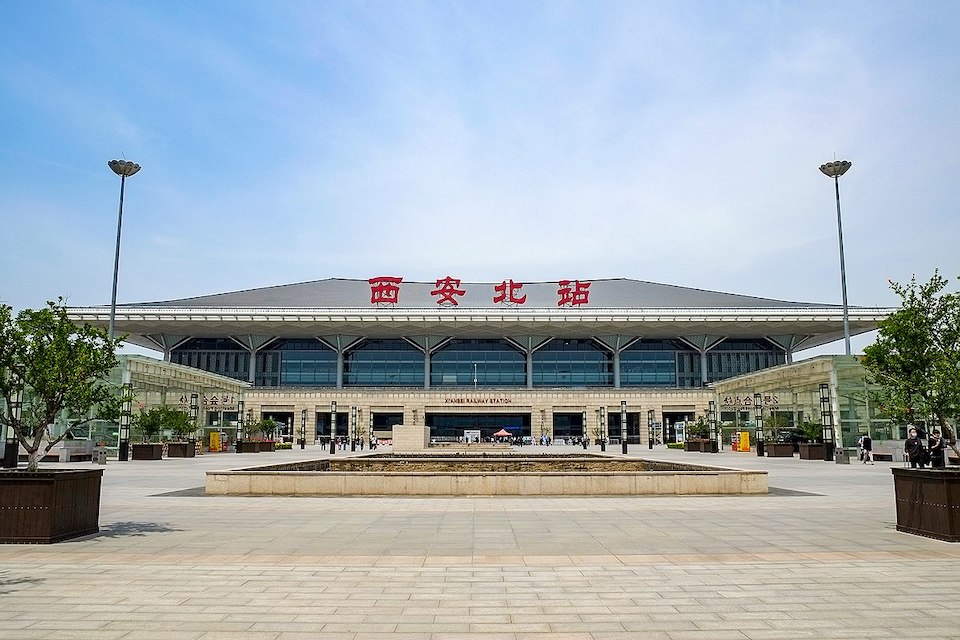
Means of Transportation in Xi’an City – China
The means of transportation in Xi’an are very diverse, meeting the needs of many tourists.
- Bus: Buses are often used for short trips to places such as Huashan Mountain, Luoyang, and Hukou Waterfall. Xi’an has 7 major bus stations, connecting to neighboring cities and tourist attractions.
- Metro: The Xi’an Metro system currently has 4 lines, connecting major attractions such as Xi’an Sports Garden, Daming Palace, Bell Tower, Shaanxi History Museum, Da’an Buddha, and major bus stations. High-speed trains will help you save travel time.
- Taxi: Taxis are a convenient option for traveling to specific destinations. The fare is usually 8.5 RMB for the first 3km, and 2 RMB for each additional km.
- Bicycle: Bicycles are still a popular means of transport in Xi’an, especially ideal for exploring the city. Cycling on the ancient city of Xi’an is an interesting experience not to be missed, allowing you to leisurely stop and admire the scenery.
- Car rental: If you want to visit many places in Xi’an with your family, renting a car with a driver will be a more convenient option, helping to save time waiting for the car.
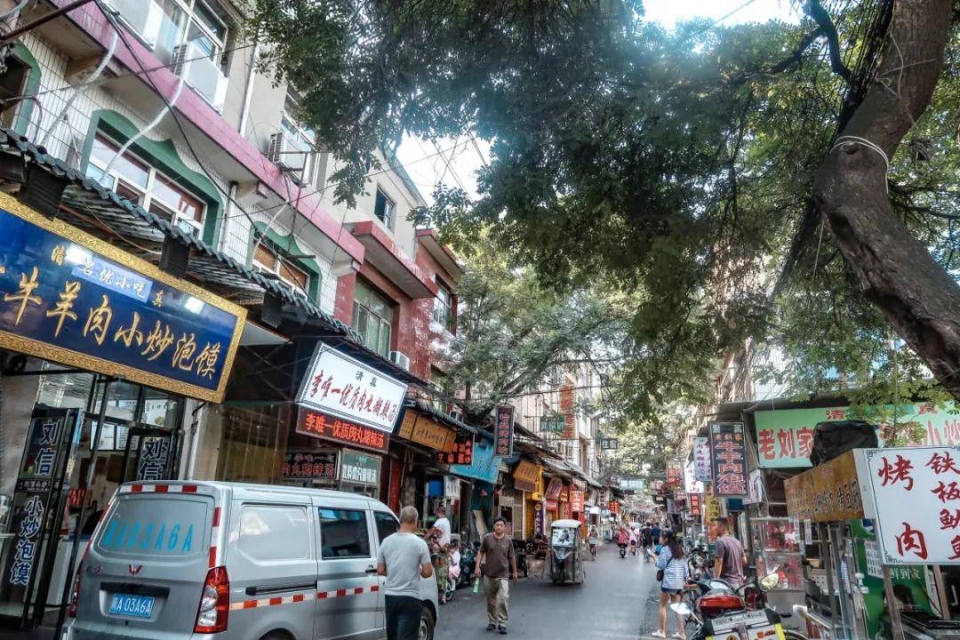
What is the best season to visit Xi’an?
The historic city of Xi’an attracts visitors in all four seasons with its own unique beauty. The best time to go to Xian is in spring (March – May) and autumn (September – October), when the its weather is mild and pleasant. Spring brings fresh beauty with cherry blossoms blooming at Qinglong Temple. Autumn is charming with the brilliant yellow of maple leaves, the aroma of ripe fruit, and the beautiful harvest scene.
Summer (June – August) in Xi’an is hot and humid, an ideal time for trekking and mountain climbing activities. However, this is also the summer vacation time for students, so the number of tourists will be quite crowded.
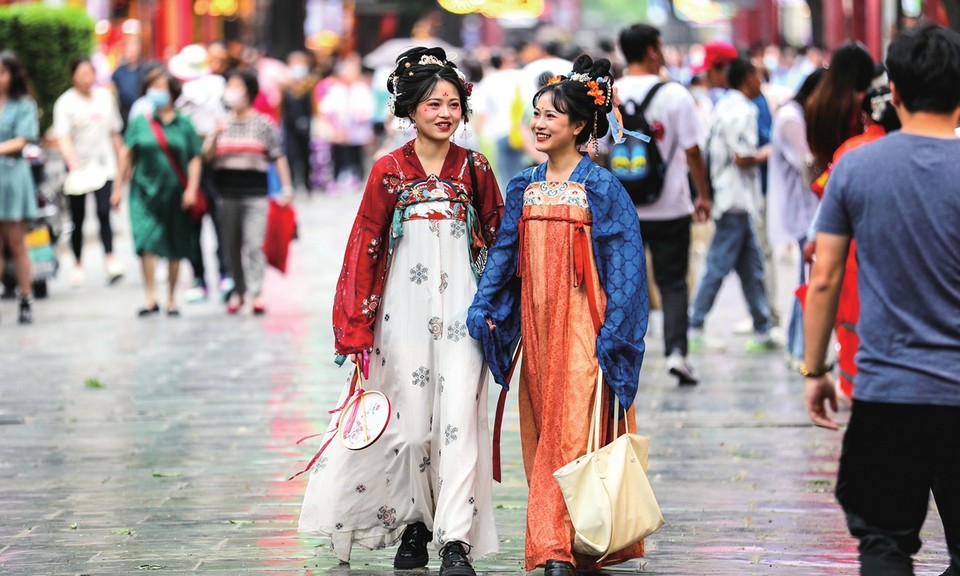
(*) Note: China has two major holidays: National Day (October 1-7) and Lunar New Year in January or February. You should avoid visiting Xi’an during these times because the number of visitors will be very large, causing overcrowding and high prices.
Popular Tourist Attractions & Activities in Xi’an – China
Mausoleum of Qin Shi Huang – The First Emperor of China
About 40km northeast of Xi’an city center, the Mausoleum of Qin Shi Huang is one of the great wonders of the world you must visit in Xi’an. This is the resting place of the first emperor of China, built over 39 years (246-208 BC) with the participation of more than 700,000 people.
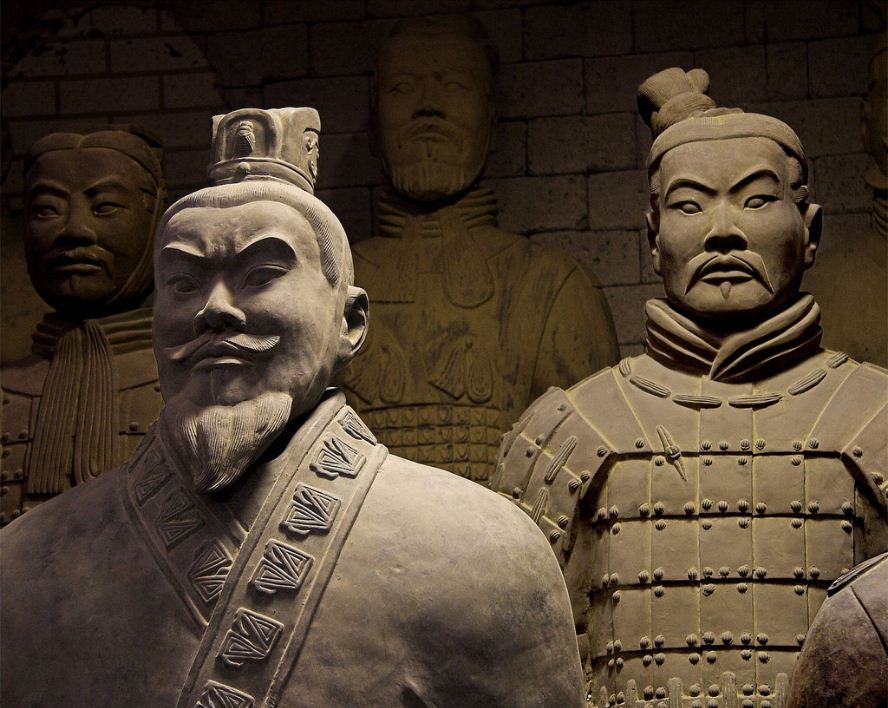
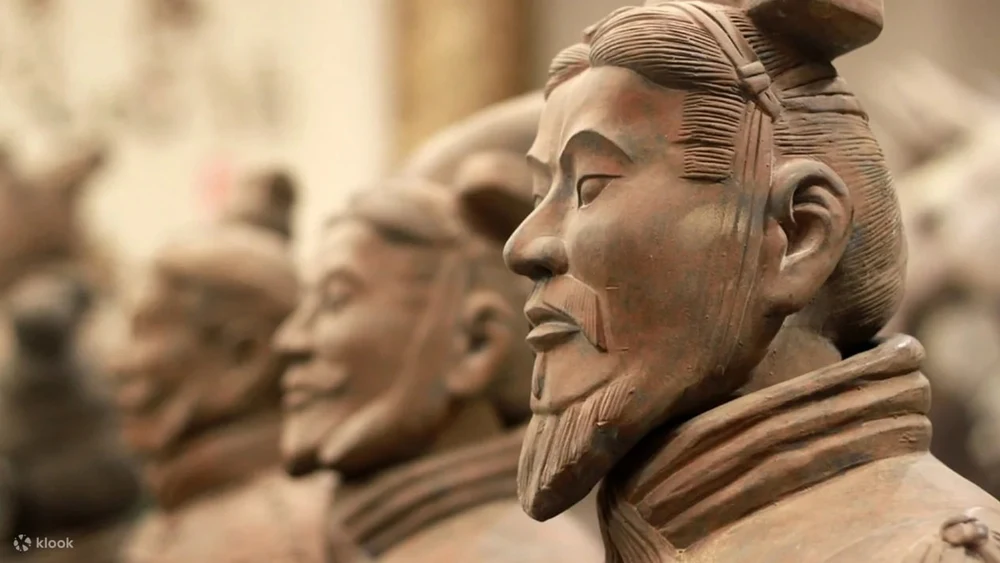
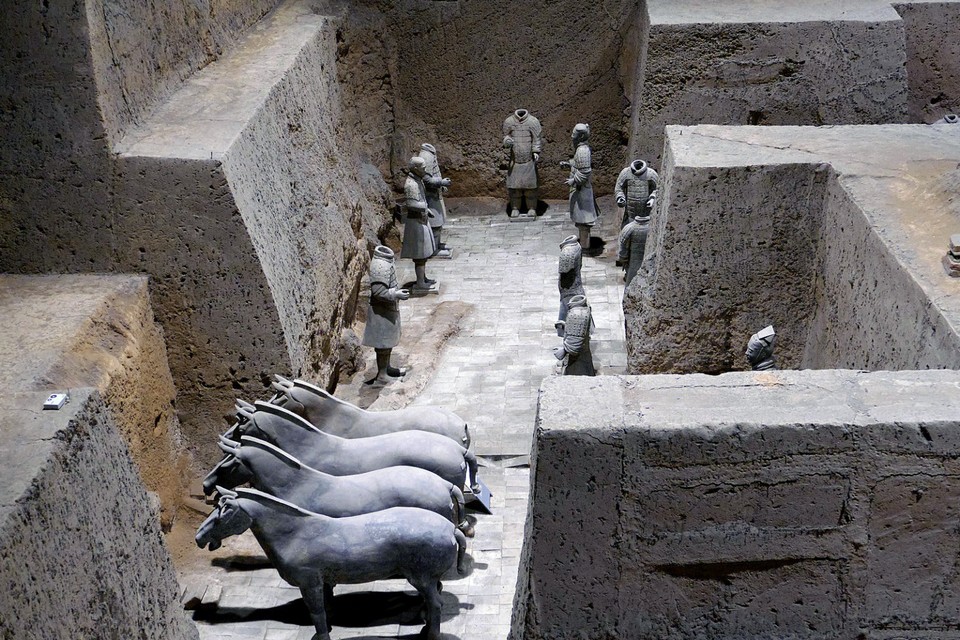
The most special feature of the mausoleum is the terracotta army simulating the mighty army of Qin Shi Huang. Three large burial pits spread over an area of over 20,000 square meters, containing nearly 8,000 soldier statues along with bronze chariots and weapons. Each soldier statue has a different facial expression, hairstyle and costume, showing meticulousness and elaboration in every detail. This Terracotta Army was recognized by UNESCO as a World Cultural Heritage in 1987 and was honored as the 8th Wonder of the World.
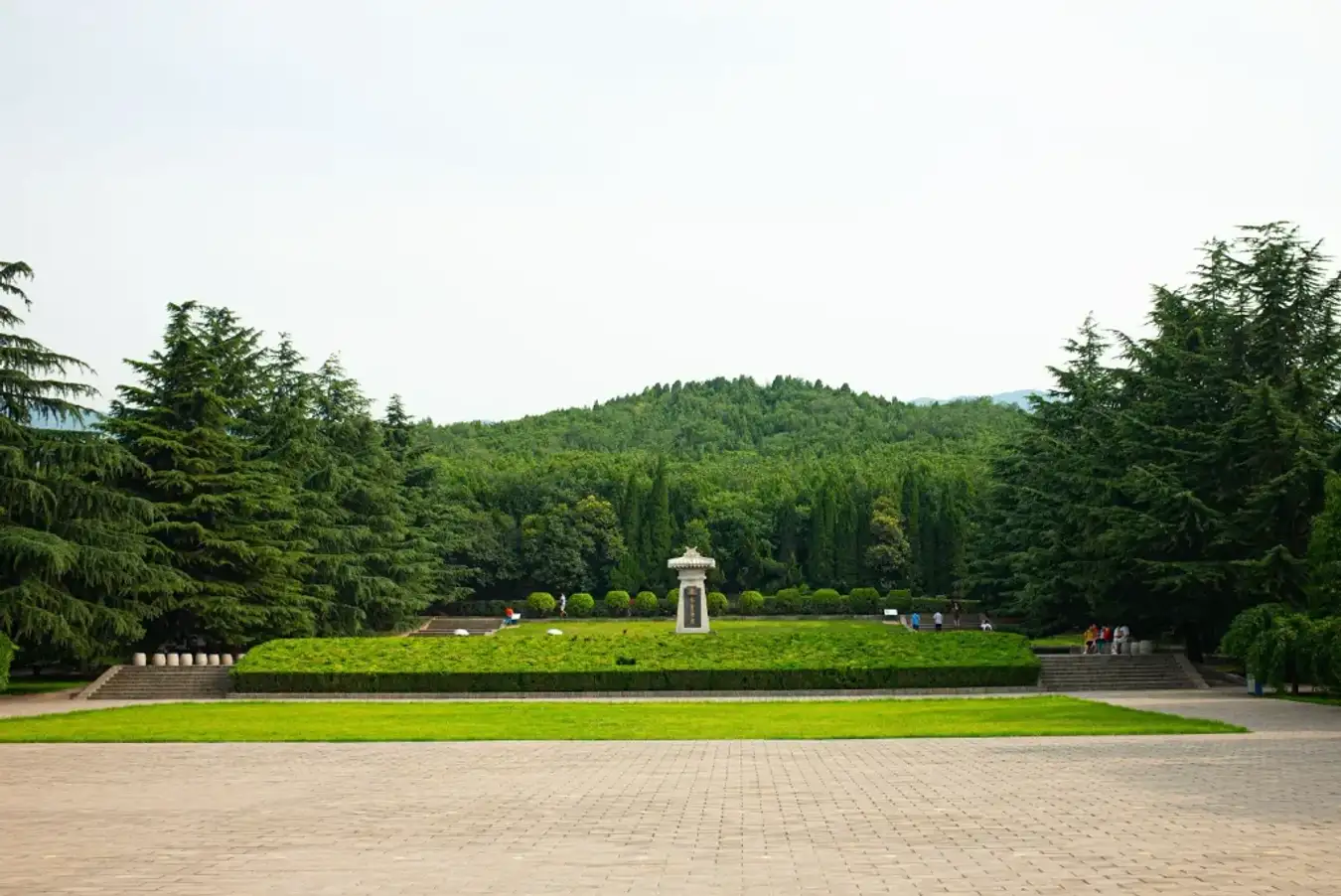
The Great Ming Palace (Daming palace) – Evidence of the Prosperity of the Tang Dynasty (#Xian China travel blog)
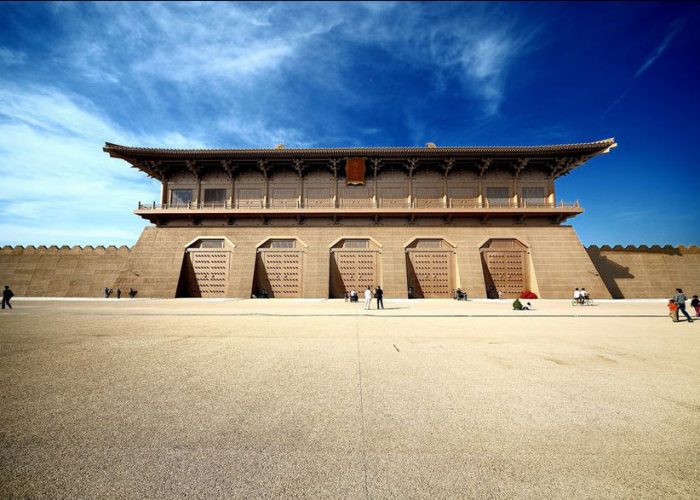
The Great Ming Palace, located north of the city center of Xi’an, was once a symbol of the power of the Tang Dynasty (618-907). With an area of up to 3 square kilometers, it was once the largest diplomatic and cultural center at that time, surpassing even the Palace of Versailles and the Forbidden City. The palace is divided into two areas: Qian Chao, where the court was held, and Nei Ting, the royal living space.
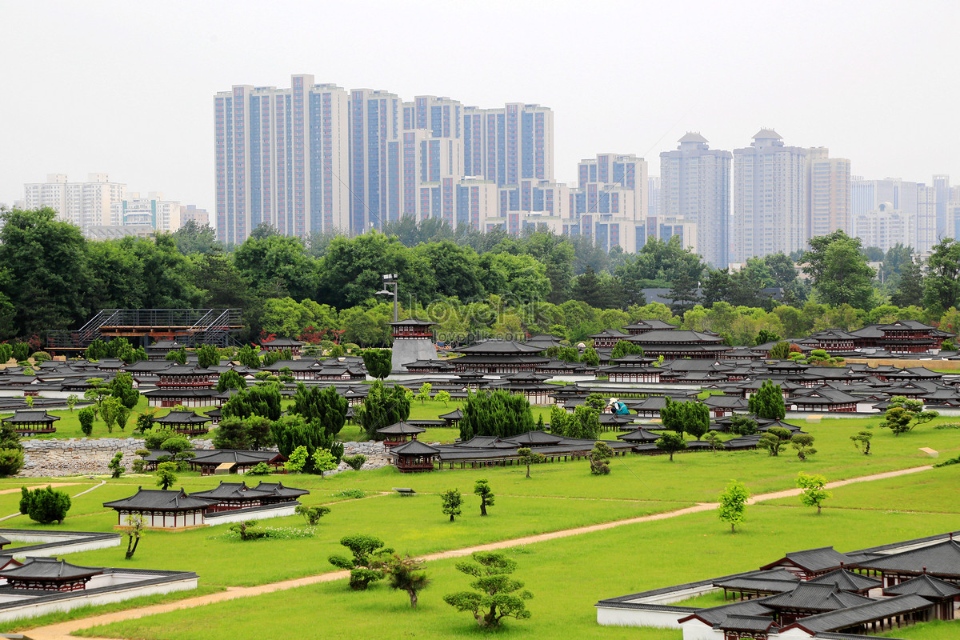
Although it was destroyed by war, the palace has now been excavated, partially restored and turned into a national heritage park. You will have the opportunity to learn about Chinese history at the museum, and the preserved relics. Take the metro line 4 to Daminggong Station, or line 2 to Daminggong Xi Station, then continue on foot or by taxi. Buses 2, 17, 22, 38, 104, 209, 263, 309, 409, 517, 703 and 801 also stop near this area.

Cycling to See the Ancient City Wall of Xi’an
With its long history and impressive architecture, the Xi’an City Wall is considered the largest and best-preserved ancient military defense structure in China. Built mainly during the Ming Dynasty, the wall is 12 meters high, surrounding the old town with a perimeter of 13.74 km. The wall still retains many defensive architectural details such as moats, drawbridges, watchtowers, archery towers and gazebos. The four main gates are Changle (East), Yongning (South), Anding (West) and Anyuan (North), each with its own distinctive architecture.
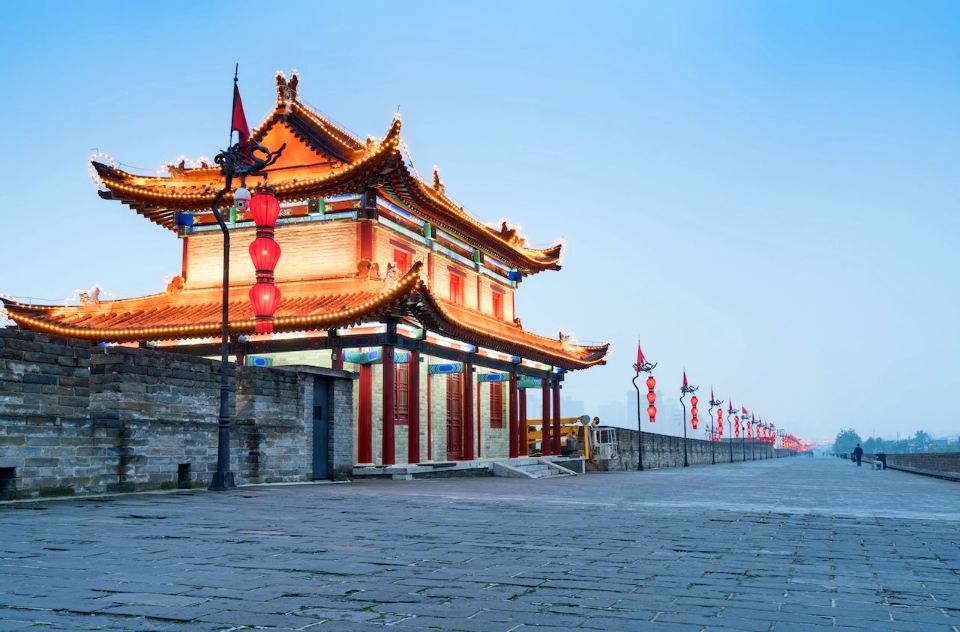
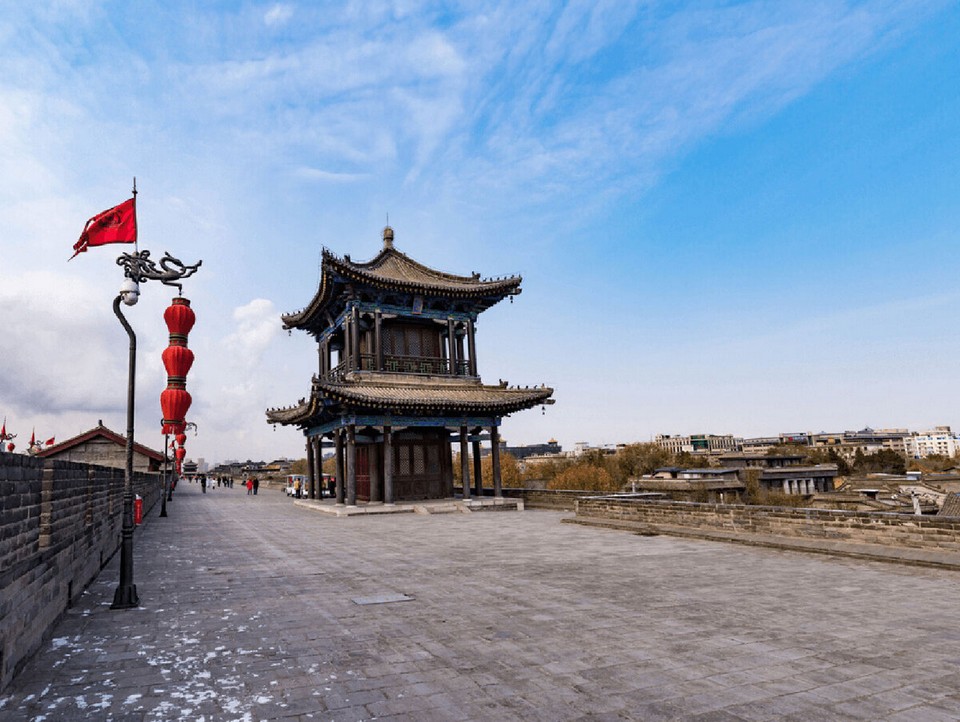
Major events such as international marathons, lantern exhibitions, martial arts performances, the changing of the guard ceremony and the “Impressions of Chang’an” program often take place here. Cycling is an interesting experience, allowing you to clearly see the whole view of this construction. Spring and autumn are the ideal times for you to comfortably cycle around without worrying about the heat or rain.
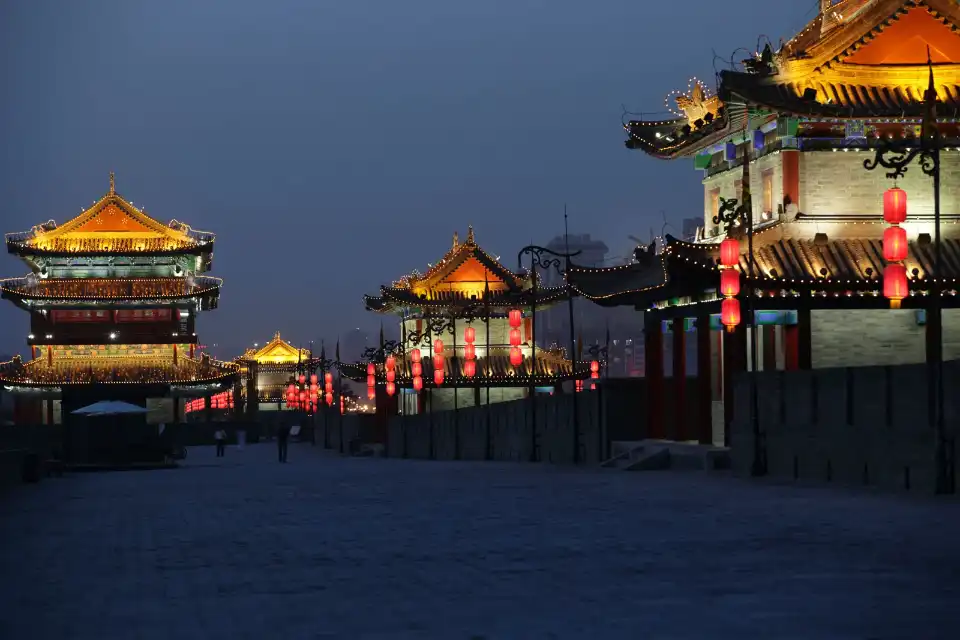
Great Wild Goose Pagoda – Discovering Journey to the West
Standing out in the heart of Xi’an, Big Wild Goose Pagoda (Dai Yen Thap) is an ancient pagoda, built more than 1,300 years ago. This place is considered a precious gem on the Silk Road, attracting tourists with its unique architecture and rich Buddhist cultural heritage.
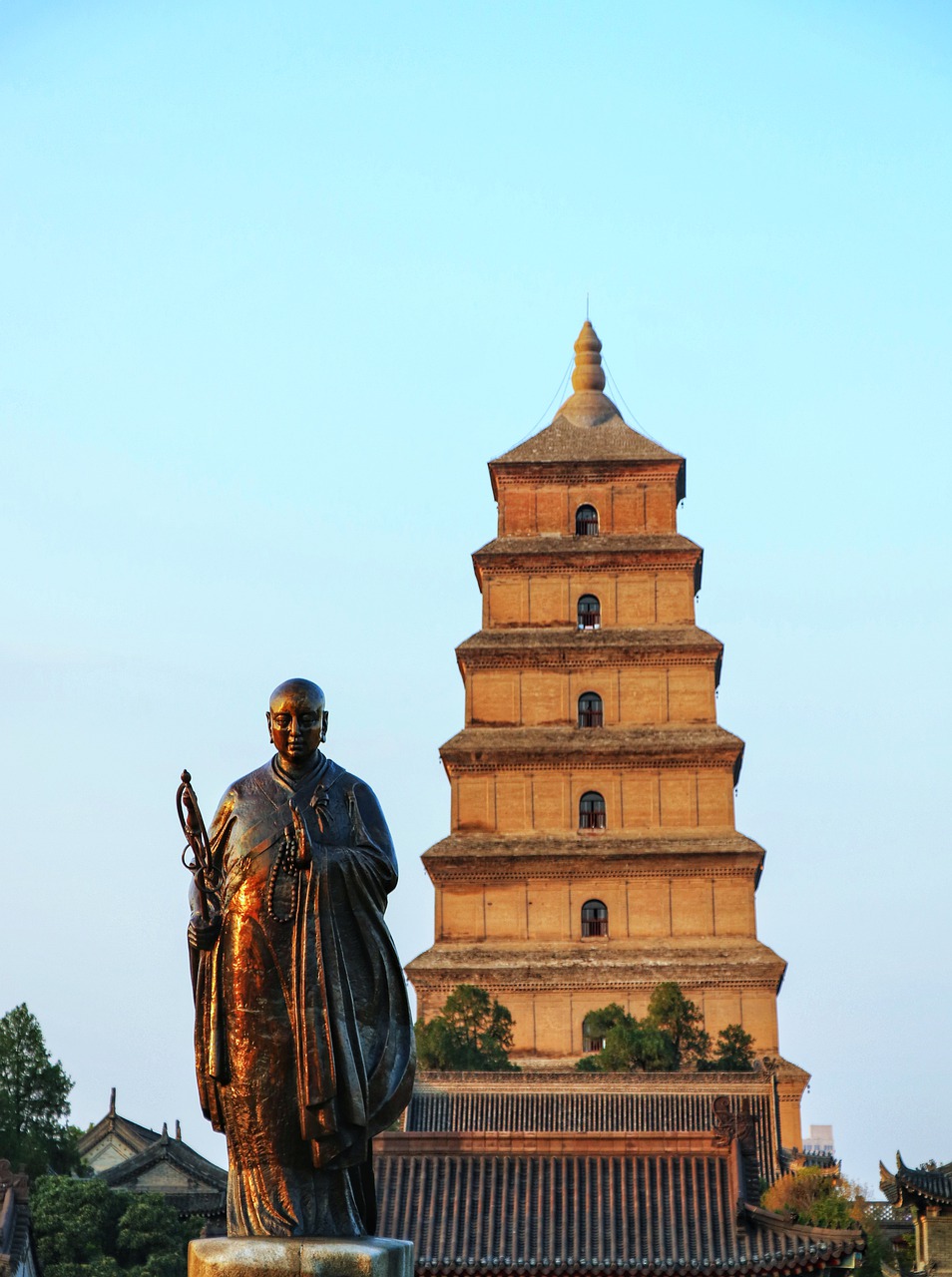
In the grounds of Daci’en Temple, where Big Wild Goose Pagoda is located, people will admire Chinese-style pagodas and learn about the life of monk Xuanzang at Xuanzang Pagoda. The tranquil atmosphere from the bell tower and drum tower further enhances the appeal of this place. here.
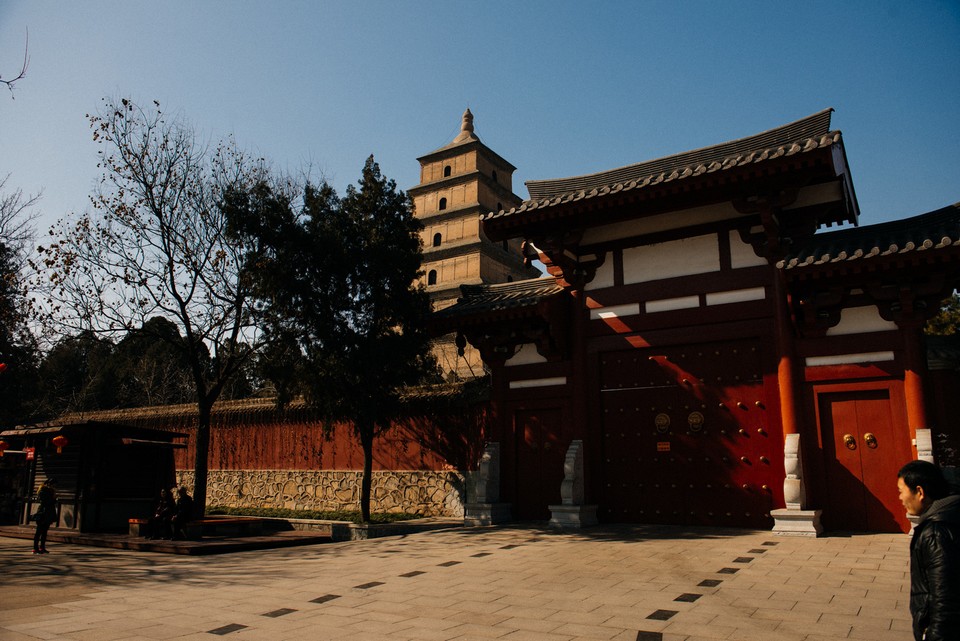
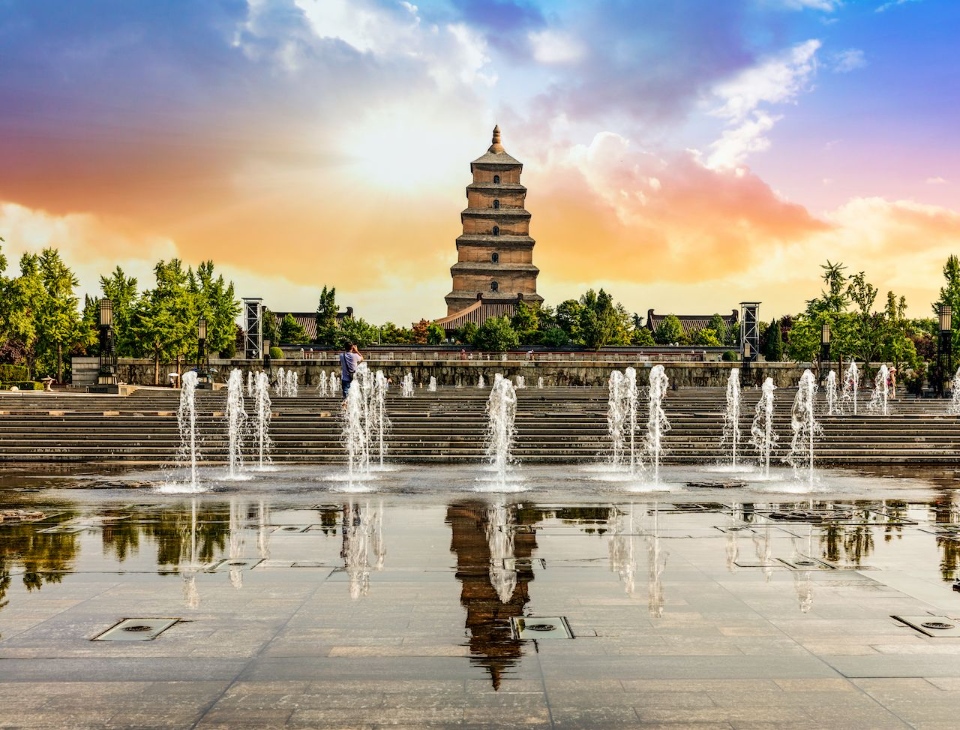
And the highlight of the pagoda, the Big Wild Goose Pagoda. Inside the pagoda, visitors will see Buddha statues, paintings and famous poems that have existed for more than 1,000 years, along with a gilded bronze Buddha statue. The top floor offers a panoramic view of the ancient city. Don’t miss the north square, which has the largest fountain in Asia with a brilliant light and water show in the evening!
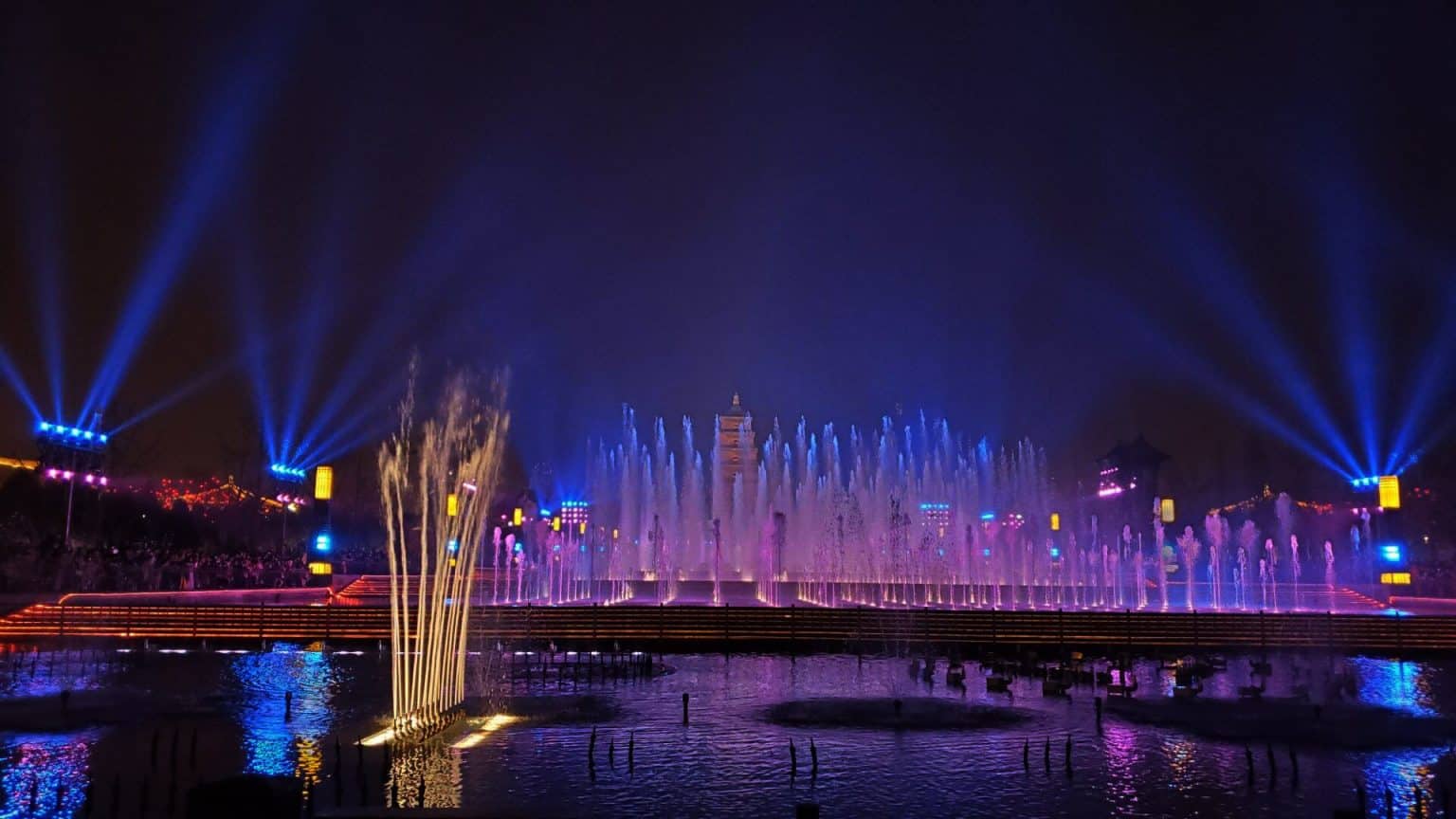
Shaanxi History Museum – Immerse Yourself in the Flow of History
Located on an area of 65,000 square meters, the Shaanxi History Museum is China’s first large-scale modern national museum. It displays more than a million artifacts, from prehistoric stone tools to artifacts dating back over a million years.
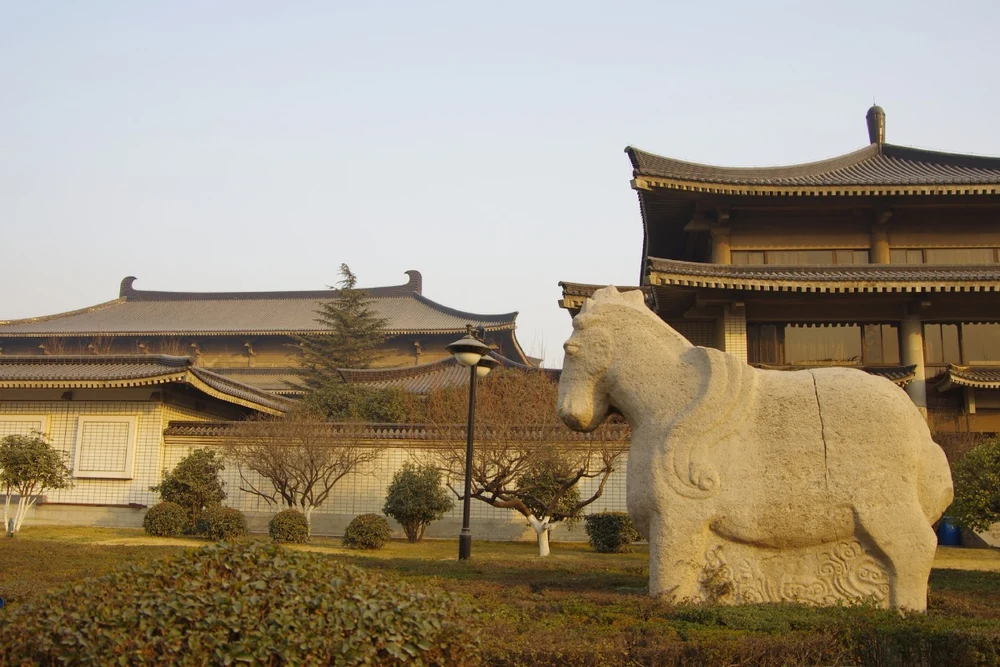
The museum features Tang Dynasty palace architecture with a symmetrical layout, and the main and secondary buildings are arranged harmoniously. The exhibition halls are divided into historical periods, from prehistoric times to the Tang Dynasty, introducing Shaanxi, the land that was once the capital of 13 dynasties, including Qin, Han, and Tang.
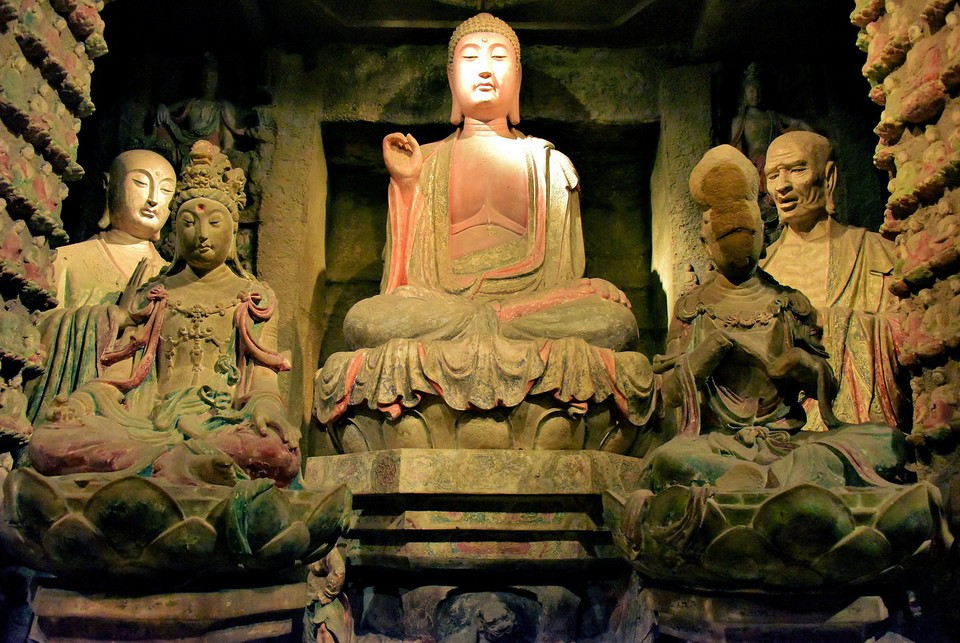
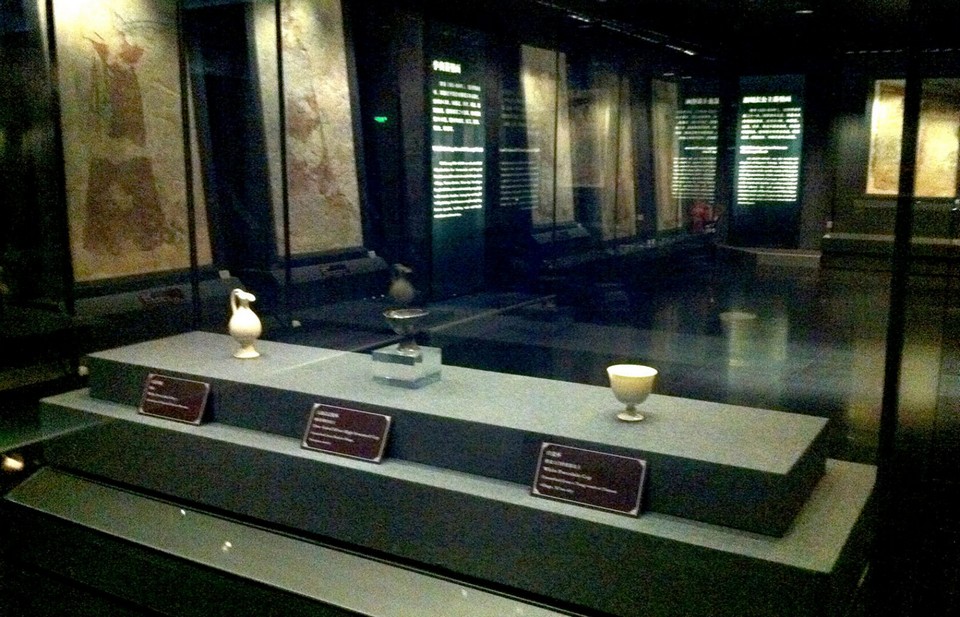
Some of the prominent artifacts are Qin soldiers, “Empress’s Seal” golden seal, and jade animal-head cups, demonstrating the cultural exchange between China and the West. In particular, the Tang Dynasty mural exhibition area with more than 600 vivid paintings depicting life at that time attracts a lot of attention.
Please note that the museum limits the number of visitors each day, so you must book tickets in advance on the website!
Below we recommend more best budget, mid-range and upscale hotels with good ratings and reviews you can refer to.
- The Westin Xi’an (Agoda, Booking)
- Angsana Xi’an Lintong (Agoda, Booking)
- Xi’an Eastern House (Agoda, Booking)
- Gran Melia Xi’an (Agoda, Booking)
- Sofitel Xian on Renmin Square (Agoda, Booking)
- The Ritz-Carlton, Xi’an (Agoda, Booking)
- W Xi’an (Agoda, Booking)
- Grand Park Xian (Agoda, Booking)
Check out more top and best hotels in Xian on Agoda.com or Booking.com
Delicious Dishes in Xi’an You Should Try
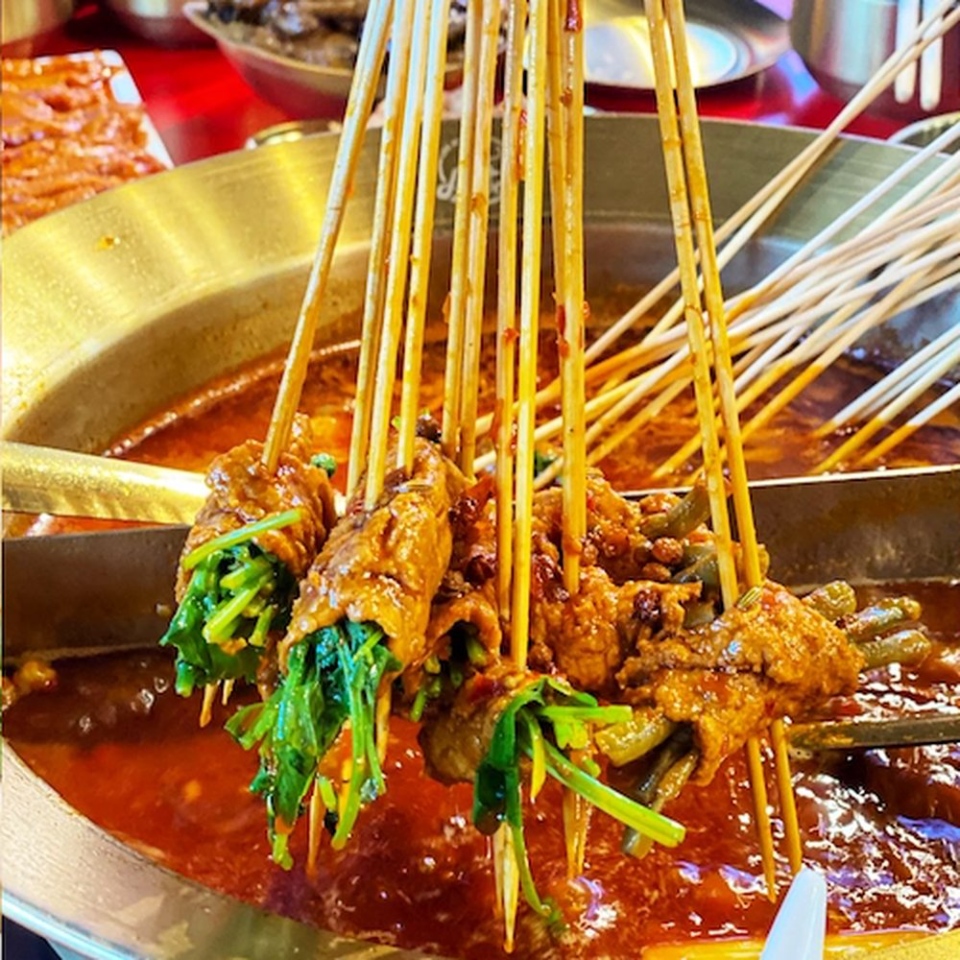
Xi’an, the ancient capital of China, is not only famous for its glorious history but also for its rich and attractive cuisine. If you have the opportunity to come here, don’t miss the opportunity to enjoy the following special dishes:
Xi’an Suantang Dumplings
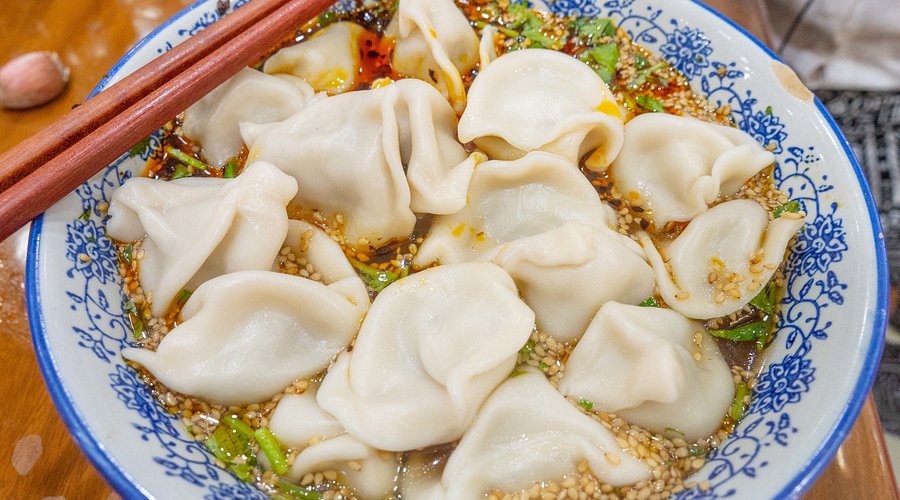
With a history of more than 1000 years, suantang dumplings are characterized by a sour and spicy broth, often with lamb filling. The broth is made from more than 13 ingredients, including sweet vinegar, dried shrimp, roasted sesame, chicken fat and butter. The combination of sour and slightly spicy flavors and the aroma of spices creates an unforgettable culinary experience. Dengjia Restaurant on Fen Lane is the ideal place to enjoy this dish.
Biang Biang Noodles With A Distinctive Spicy Flavor
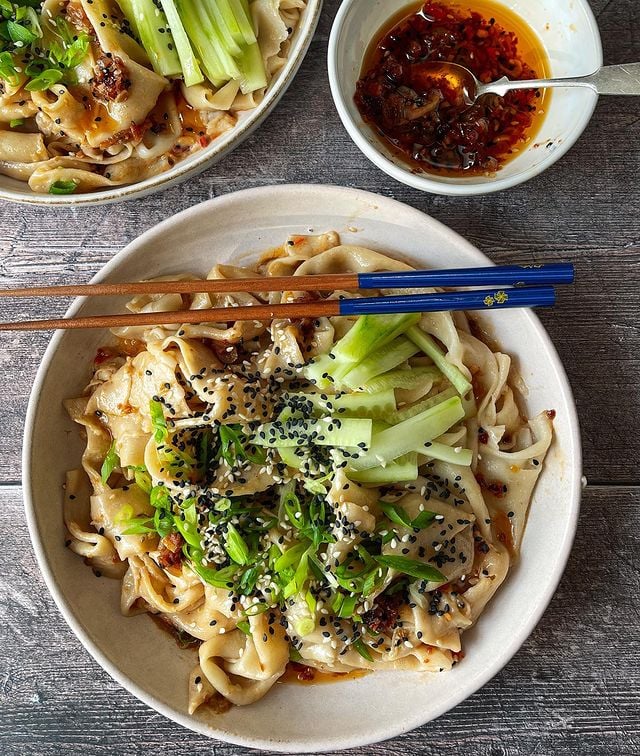
Biang Biang Noodles are Xi’an’s most famous noodle dish, with thick, chewy noodles, handmade. The noodles are mixed with spicy chili oil, cinnamon, star anise, along with carrots, celery, coriander, beans and beef. Hundreds of Biang Biang noodle shops line the Muslim Quarter, so you will easily find this dish when traveling to Xi’an.
Yangrou Paomo Lamb Soup (Xian torn bread with lamb soup)
This lamb and pita bread soup has a history dating back to the 11th century BC. The bread is broken into small pieces and simmered in a rich lamb broth, creating an unforgettable delicious flavor. The broth is thick, rich in nutrients, bringing a feeling of warmth and fullness for a long time. Just a small bowl is enough to captivate you with its seductive aroma and sweet aftertaste, making you want to eat more!
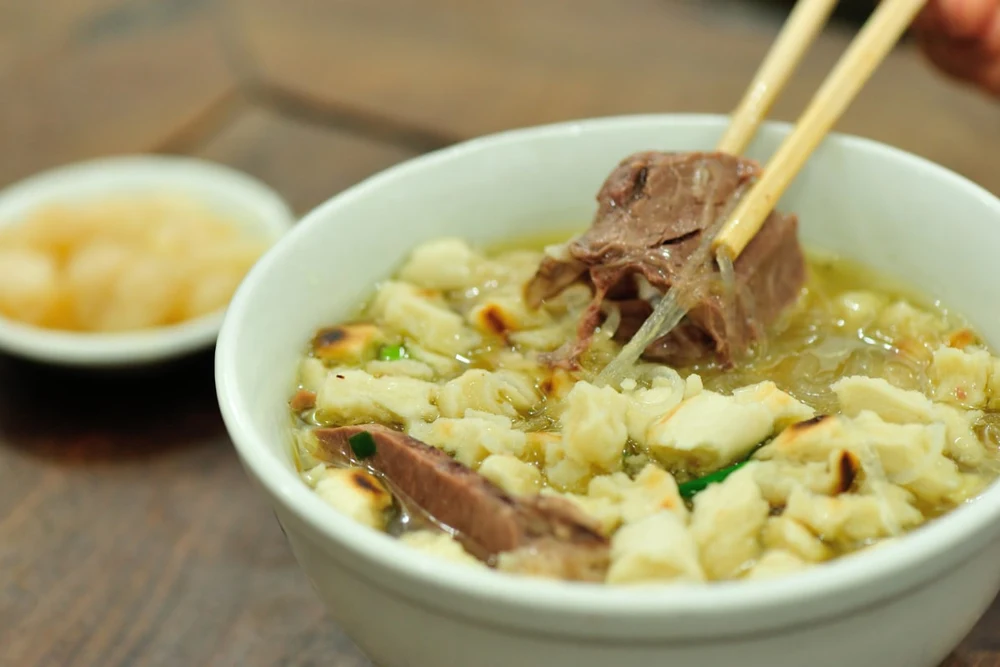
Liangpi Cold Noodles – Cool and Delicious
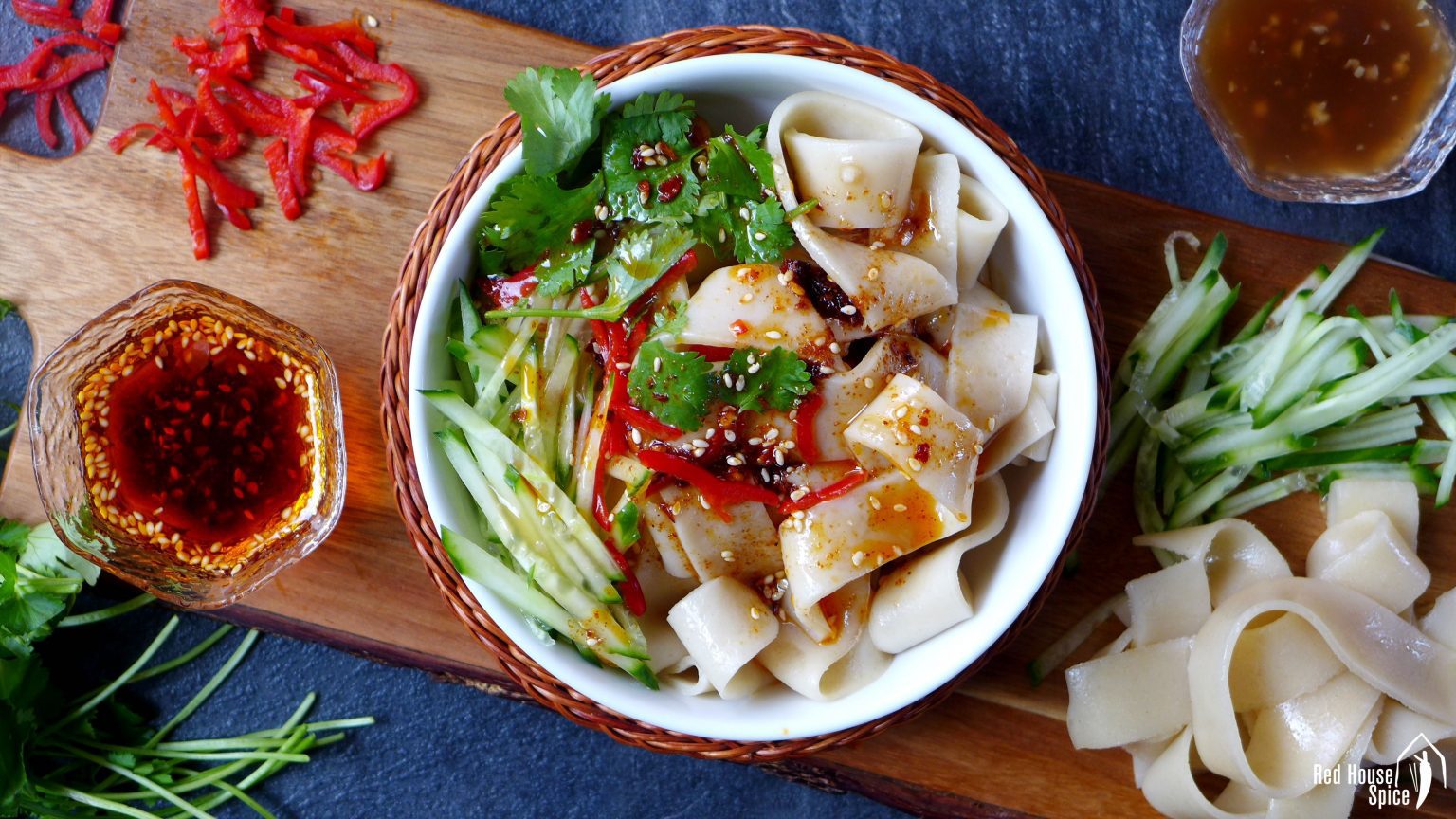
This cold noodle dish originated in Shaanxi province and is very popular in Northern China. Made from wheat flour or rice flour, Liangpi is served with vinegar, soy sauce, garlic, cucumber and bean sprouts. You can choose spicy or sweet and sour. The dish is refreshing, easy to eat, very suitable for hot summer. Liangpi has a long history, easy to find in all the snack streets of Xi’an.
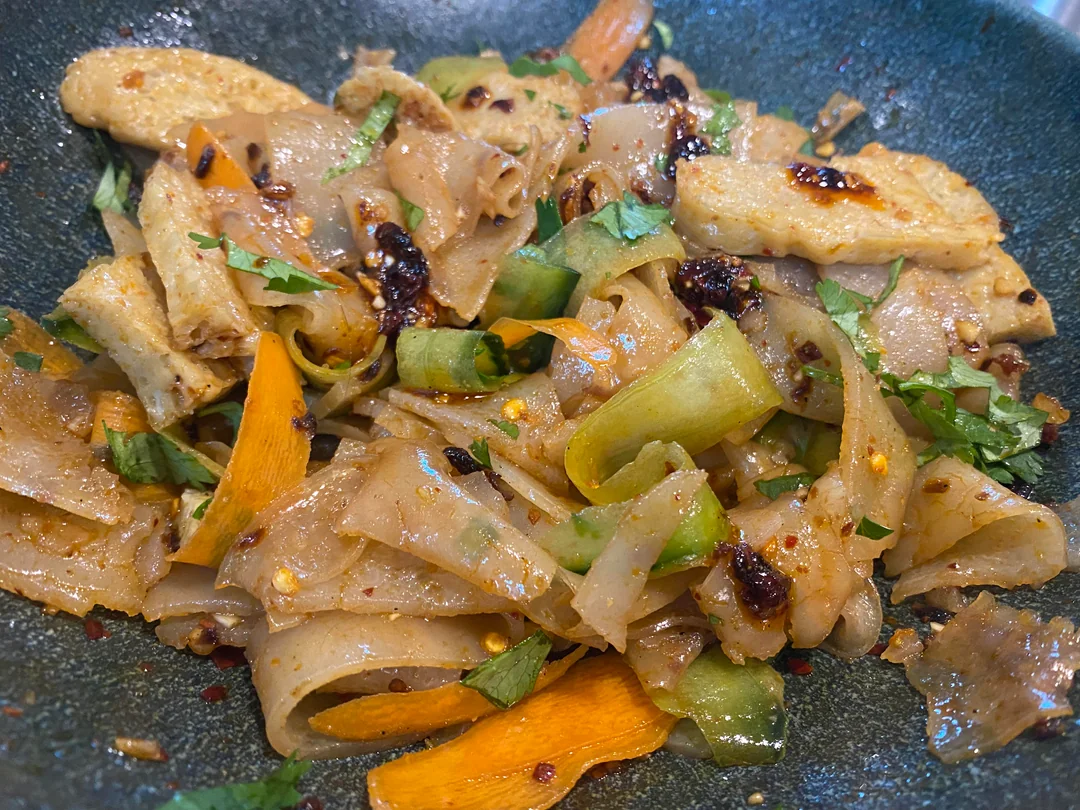
Roujiamo Meat Sandwich (Chinese Sandwich)
This is a popular street food throughout China, especially famous in Xi’an. Pork is stewed in a rich broth with more than 20 spices, then minced and sandwiched in crispy toasted bread. In Muslim areas, beef marinated in cinnamon and pepper is often used. The combination of soft, fragrant meat and crispy bread creates a simple but delicious dish.
To discover more delicious dishes, visit the Muslim Quarter, Yongxing Fang, Hanguangmen Snack Street.
Xi’an Travel Experience for Self-sufficient People

Do you want to explore the mysterious beauty of Xi’an but still want to save money? Then save the “tips” below right away!
- Travel to Xi’an during the low season (December – March 15) to save on hotel and airfare costs.
- Use public transportation such as buses or subways to get from the airport or train station to the city center. If traveling from other major cities, consider taking the overnight train to save money.
- Take advantage of free attractions such as the Muslim Quarter, Shaanxi Museum, and see the city wall from the outside.
- Walk or rent a bicycle to explore the city. Use tourist buses to get to more distant attractions such as the Qin Dynasty.
- Shop in the Muslim Quarter or local markets instead of large shopping malls.
- Join group tours to save money compared to private tours.
- Prepare a 4G SIM card, 4G eSIM, or Chinese wifi router in advance to conveniently look up addresses, book a car, and buy tickets online for tourist attractions.
The glorious history of an ancient capital always has a strong attraction, and Xi’an is the ideal destination for those who are passionate about discovery. Not only famous for its majestic terracotta warriors and ancient architectural works, this place also opens up an exciting journey through each street, each relic, all bearing the mark of a glorious empire. This is definitely an indispensable stop on everyone’s exploration list.
The post first appeared on Klook Vietnam and was translated, more compiled and edited by Living Nomads. If you find any images or text that belong to you, please contact us, so we can credit you or give us permission to use them. Thank you very much!
Some best day tours, trips, activities and transfer services, tickets in, from and to Xian you can refer to
- Xi’an Highlights Day Tour
- Cultural Xi’an One Day Tour
- Xi’an Ancient Chinese Culture Day Tour with Banpo Neolithic Village, Museum of Terracotta Warriors and Horses, and More
- One-day Huashan Adventure Tour (upper and lower from the West Peak) – Chinese commentary (departures every day)
- Cultural Xi’an One Day Tour
- Xi’an Popular Attractions Private Charter
- Xi’an Terracotta Warriors Half Day Tour
- Morning Food & Market Tour
- Terracotta Army Ticket Xi’an
- Classic Xi’an 2 Day Private Tour
- Xi’an City Life Half Day Tour
- Private Xi’an North Railway Station Transfers for Xi’an
- Xi’an Terracotta Army Half-Day Tour
- Han Yang Ling Museum Ticket Xi’an
- Hukou Waterfall Park Ticket (Near Xi’an)
- Dream Back to Tang Dynasty Dance Show Ticket Xi’an
- Xian Qinling Wildlife Park Admission Ticket
- Cuihua Mountain National Geo-Park Admission Ticket
- Shaanxi History Museum Xi’an Admission Ticket
- Qujiang Hanyao Heritage Park Admission Ticket
- Qianling Mausoleum Ticket Xi’an
Check out more Xian guide here.




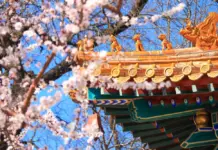
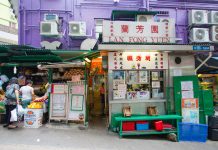
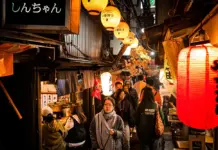
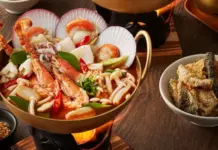




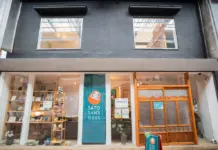





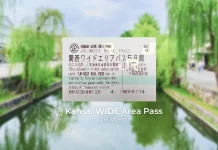



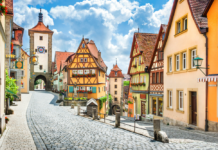



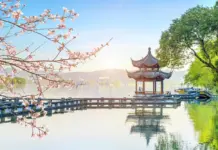


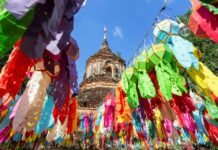

![10 best airports in Asia in 2016 [RANKED] kuala-lumpur-international-airport-best airports in asia in 2016 by skytrax ratings](https://livingnomads.com/wp-content/uploads/2016/08/29/kuala-lumpur-international-airport-best-airports-in-asia-in-2016-by-skytrax-ratings-218x150.jpg)








